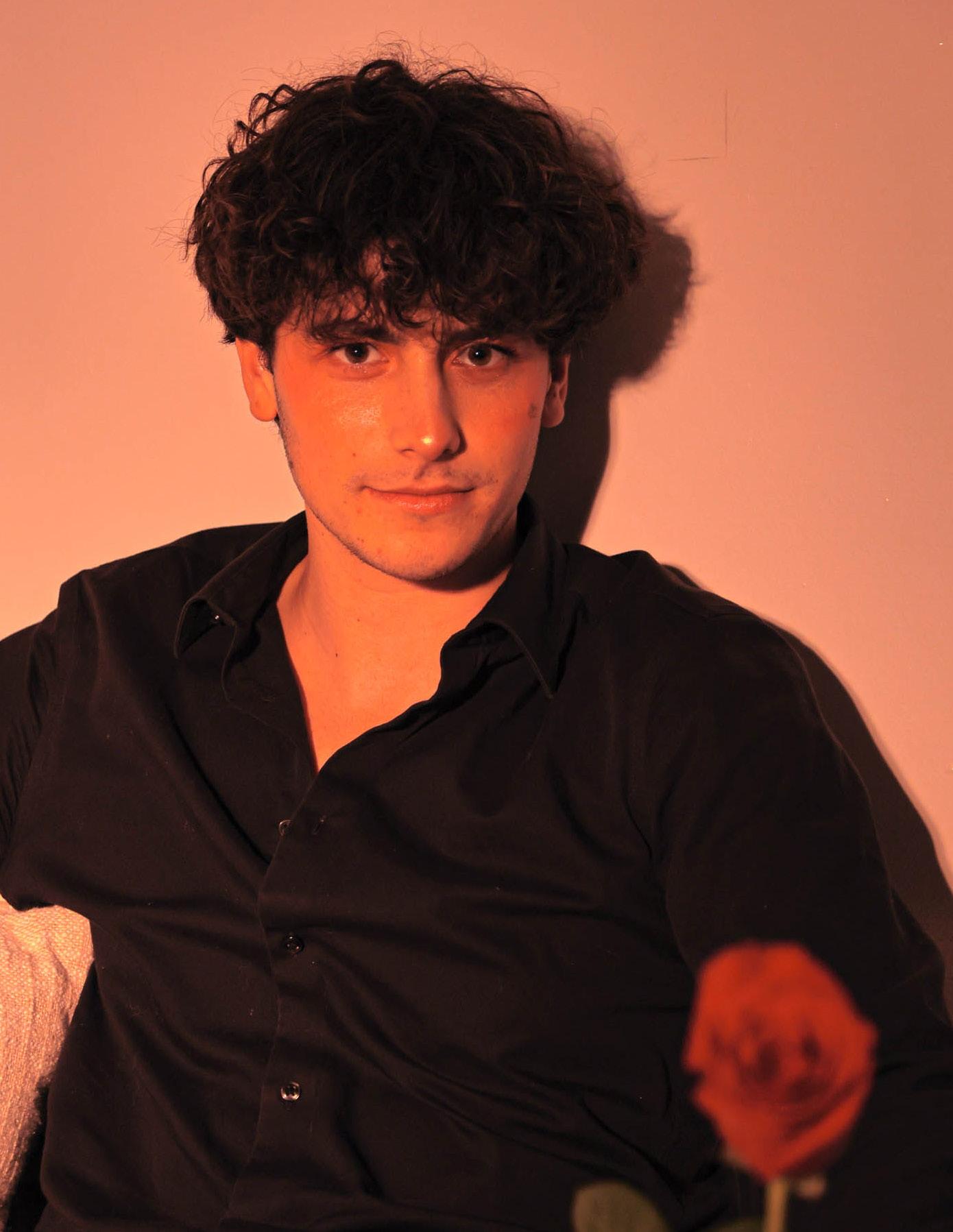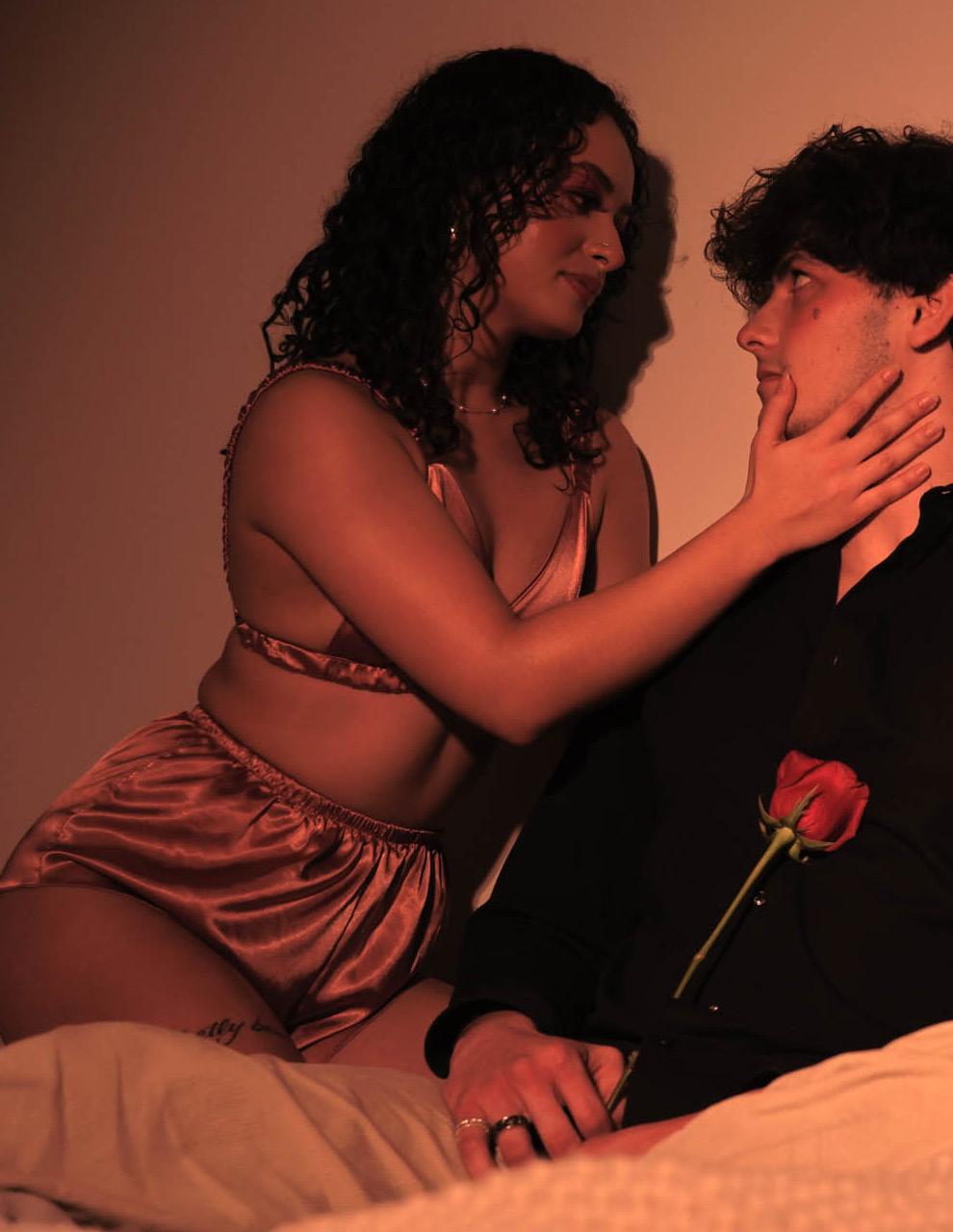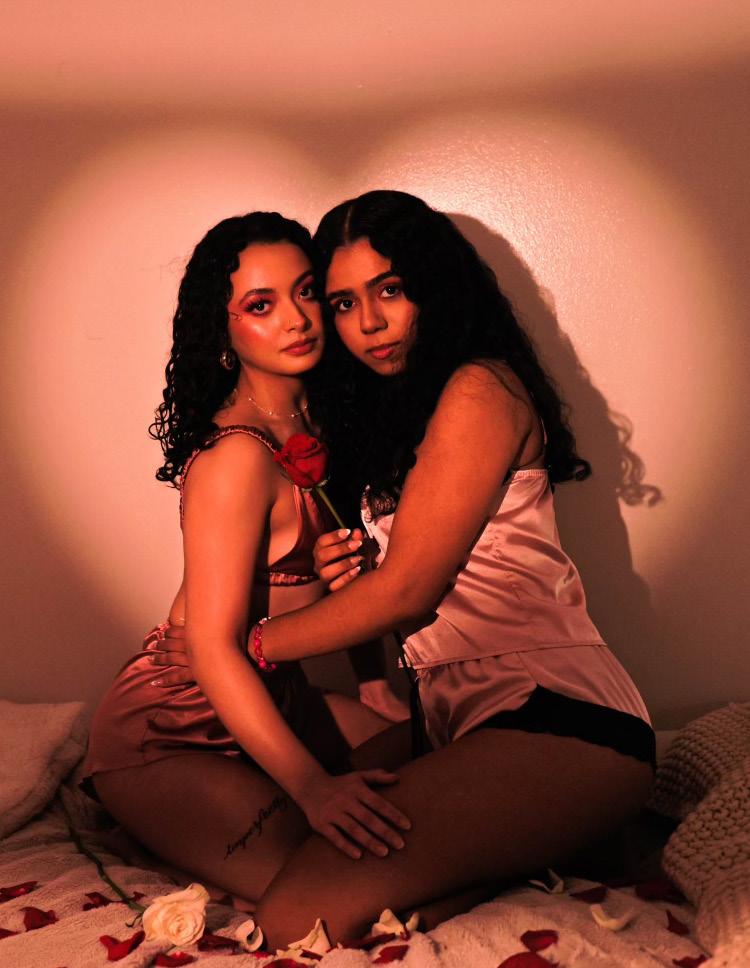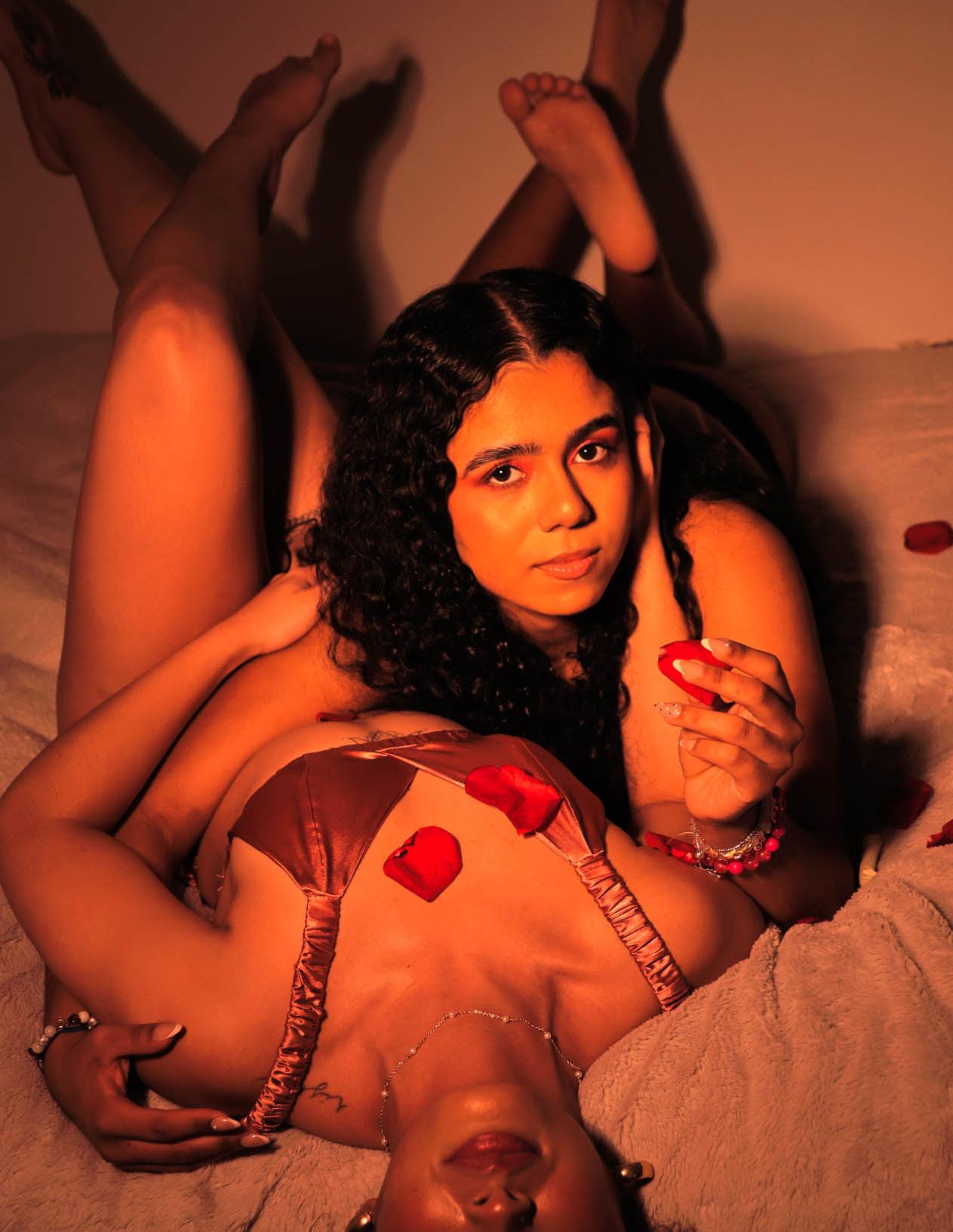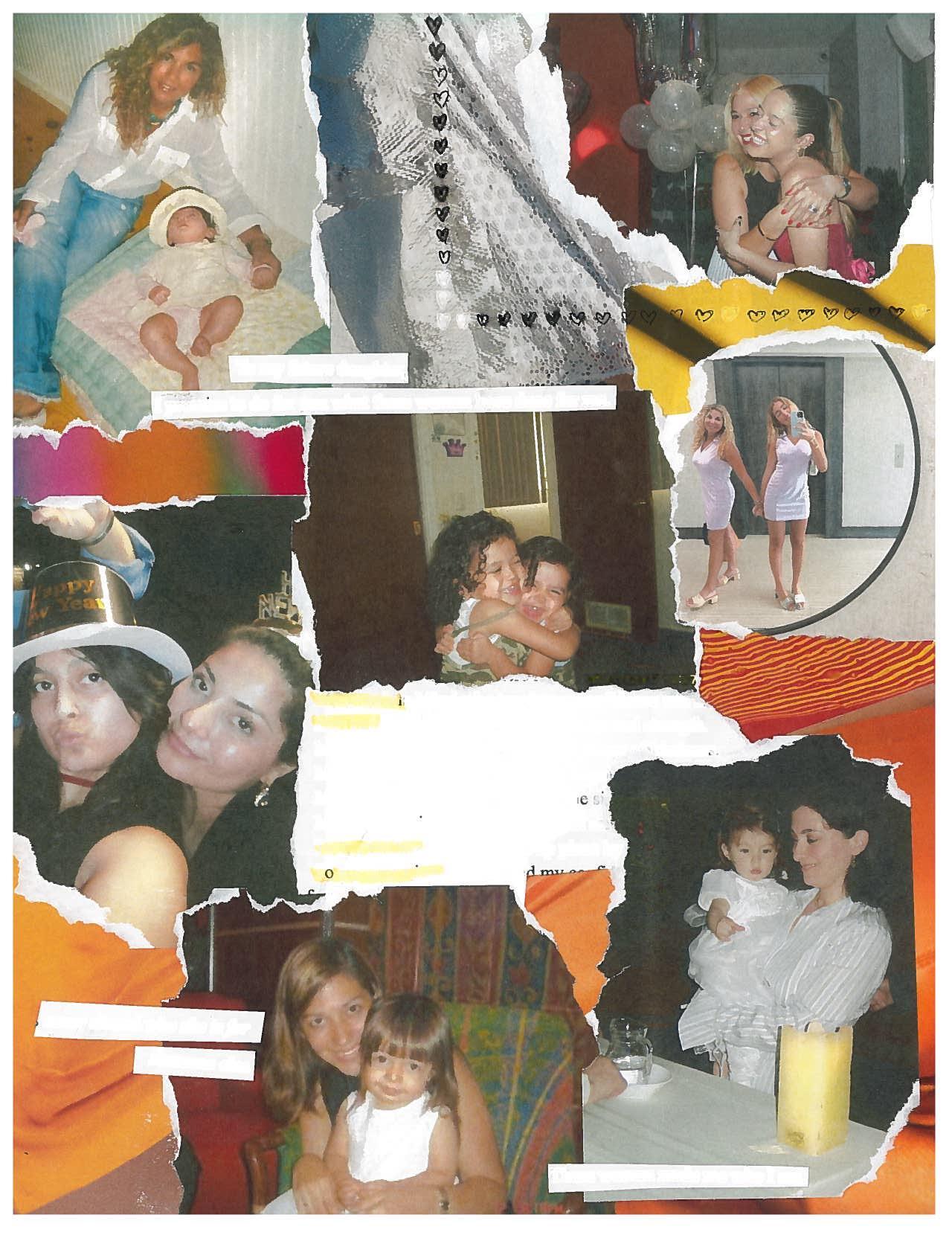

Issue Two
Writers
SofiaPeralta
ZacharyAyala
GabriellaSadowski
IsabellaCorral AdrianaVivas EliasBenitez-Gadda
AriannaSavino
BibianaSnyder
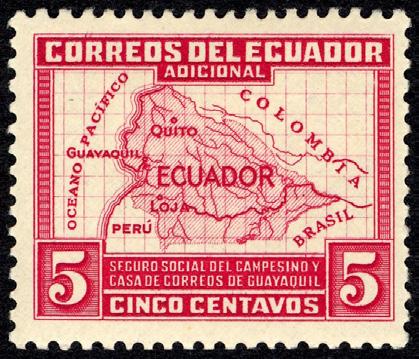

AshleyRodriguez IsabelMelendez IsabellaCorral MyrkaDominguez SunnyRaySuaya SarahSantiagoRuiz AlexiaRoisenvit
AnaEloisaArredondoDeVega AnabelleCanalsOlivencia
StylistsTeam
MaiaLockhart AdrianaVivas AnaEloisaArredondoDeVega FrancescaPiccinini SamanthaBeltran MeghavarshiniIska
MelLinShotaPinko LuciaRios-Luy FrancescaPiccinini CatalinaBermudez CarmenCarrasquillo
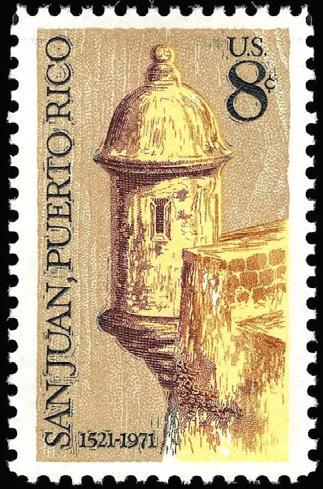
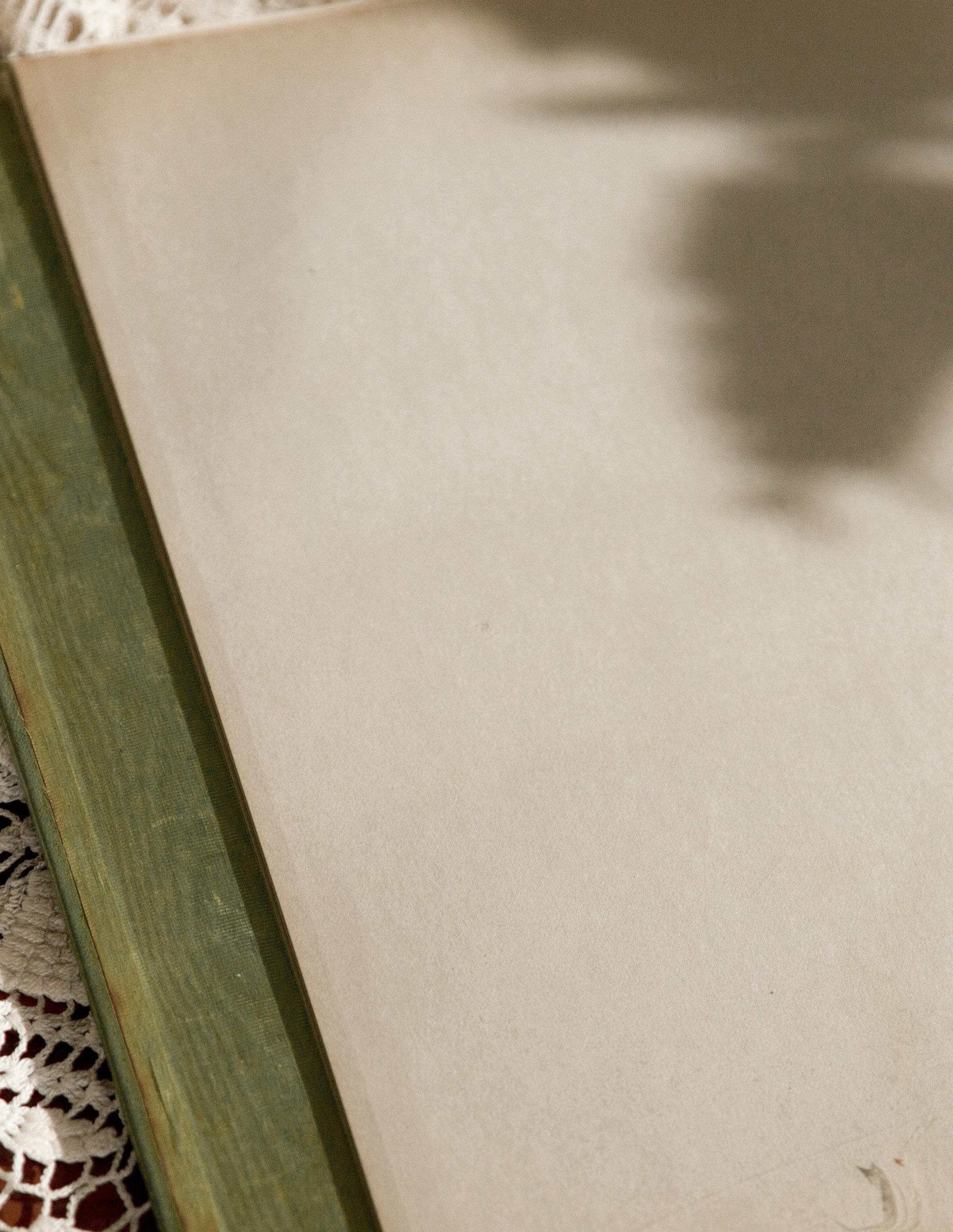
Social Media Team
Christina Stathatos
Anayancy Barajas
Ricardo A. Rodriguez Ramos
Adriana Acosta
Nuria Cancio Flores
Isabella Corral
Adriana Vivas
Amanda Salles
Ana Eloisa Arredondo De Vega
Catherine Ward
Isabella Barone
Devon Mitchell
Laura Verzegnassi
Lucia Rios-Luy
Sarah Santiago Ruiz
Sunny Ray Suaya
Carmen Carrasquillo

Sofia Georgallis
Larissa Sanchez
Sophia Castro Alexia Roisenvit
Makeup Team
Aree Clarke
Elizabeth Garcia
CloudySky Khazraishokatkhou
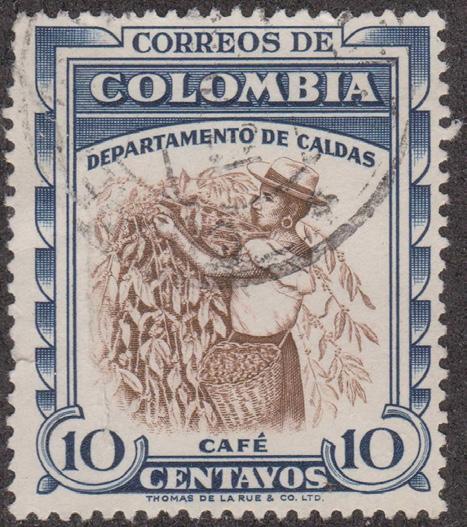
Editors Team
Ricardo A. Rodriguez Ramos
Arianna Savino
Brenne Sheehan
Bibiana Snyder
Myrka Dominguez
Sophia Maldonado
Sarah Santiago Ruiz
Ana Eloisa Arredondo De Vega
Narahí Gomez
Larissa Sanchez
Zachary Ayala
Graphic Design Team
Rick Li
Anabel Patiño
Natalia Ortiz
Carlos Magdaleno
Models Team
Myrka Dominguez
De’Lisia Adorno
Sunny Ray Suaya
Ngina Valdez
Elizabeth Garcia
Sofia Peralta
Zachary Ayala
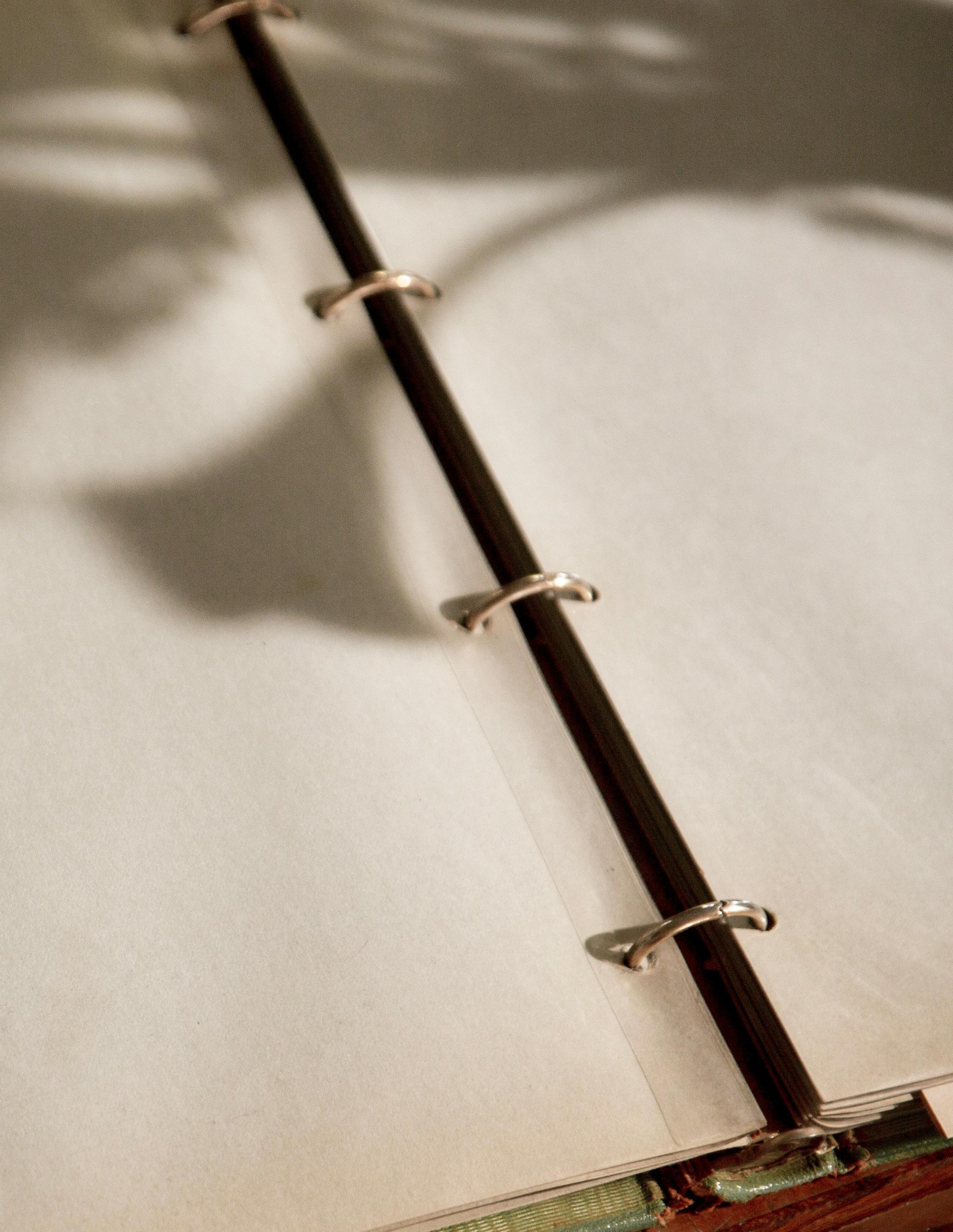



Photo&VideoTeam
DevonMitchellMelLin
DianaGarciaVaro
BrenneSheehan
CarlosWade
SunnyRaySuaya

 Natalia Alejandra Ortiz Quinones
Isabella Corral Myrka Dominguez
Devon Mitchell
De'Lisia Adorno
Luka Madhok
Natalia Alejandra Ortiz Quinones
Isabella Corral Myrka Dominguez
Devon Mitchell
De'Lisia Adorno
Luka Madhok
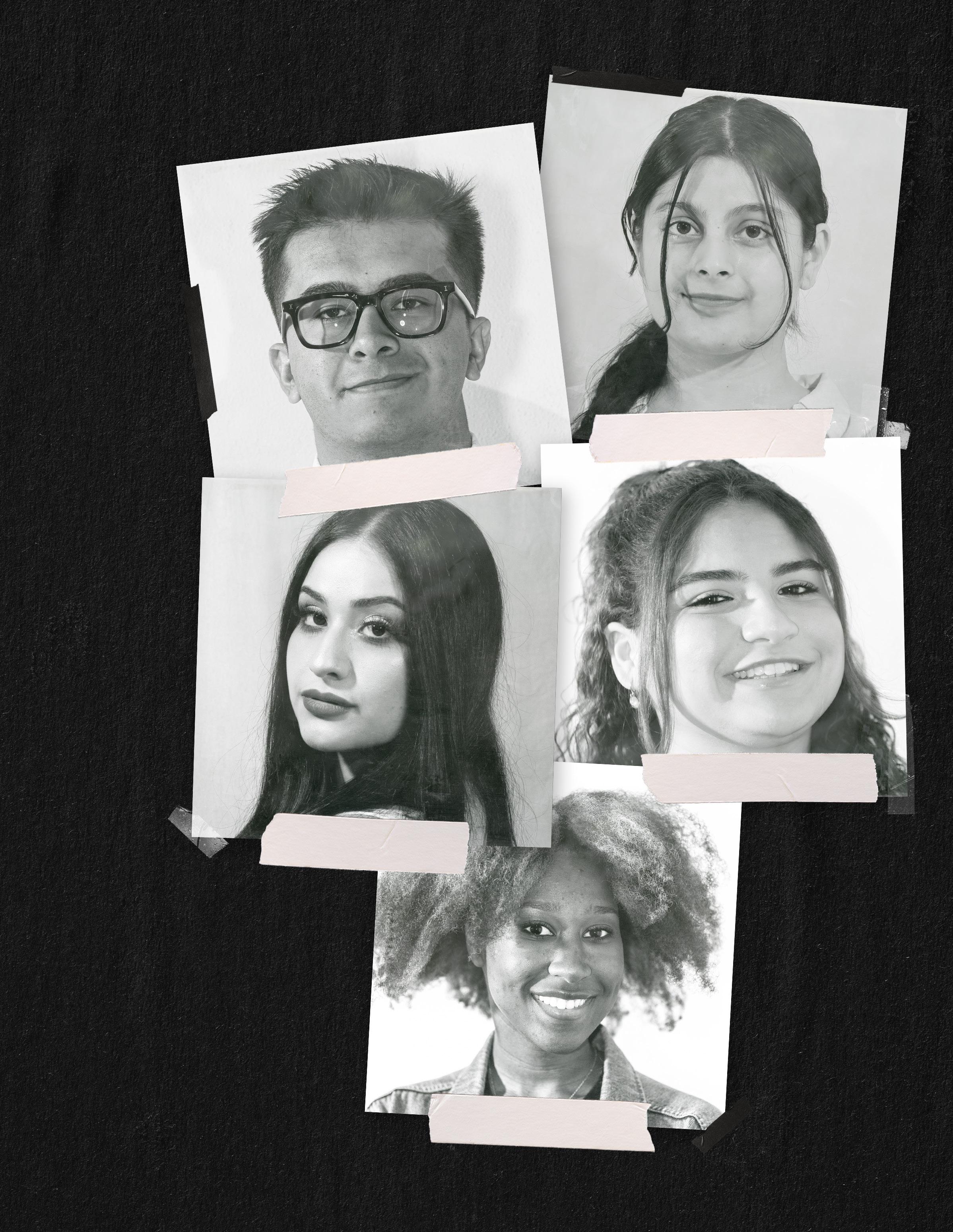 Zachary Ayala
Sofia Peralta
Arianna Savino
Isabella Flores
Zachary Ayala
Sofia Peralta
Arianna Savino
Isabella Flores
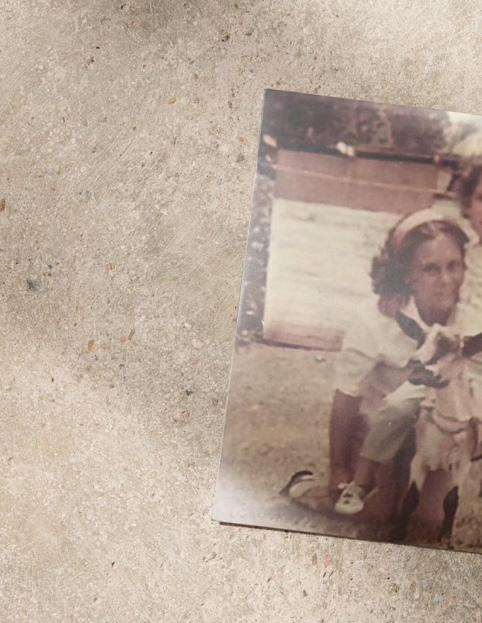
Somos quienes somos por las personas que nos rodean, las que nos criaron. Somos un rompecabeza constituido por miles de piezas que poco a poco formaron quienes somos. En esta edicion de nuestra revista, profundizamos en la esencia de nuestra herencia y raices, destacando el colorido mosaico de tradiciones, historias e identidades que definen a las comunidades Latinas/Hispanas en todo el mundo. - Natalia Alejandra Ortiz Quinones

Delsol Magazine Issue Two
I Make Sure to Remember So You Can Forget
Escrito por Isabel Andrea MelendezRosita was only nine years old when she last saw her father. Sometimes I find her crying by herself and I understand she’s lost in memories of him. A faded black and white photograph of him hangs on the dining room wall, looking over Rosita as tears stream down her face in solitude.
Rosita was born with a common condition in the 1950s in Puerto Rico which made her legs turn inward, making her unable to walk. Her father was a poor fisherman. Despite working long hours, everyday he would take her to the beach in Mayaguez, Puerto Rico. I can feel the warmth, the feeling of home as she recounts how he would massage the salty sand into her tiny, chubby legs. “He is the reason I can walk today,” she tells me with a mixture of gratitude and longing. In my head, I tell her that she is also the reason I walk today.
As Rosita grew older, her father’s absence weighed heavier on her heart. I can feel in her words that the void becomes deeper with every passing day. The more she detaches from the present, the more her mind goes back to reside in her past.
Rosita cannot tell you where she currently lives or what month it is, but she will tell you about her last memory of her mother’s face or the nuns who forced her to sit before a drawing of a demon when she was merely nine years old.
The aroma of bitter coffee and soda crackers comes to mind when I remember her sad expression as she told me these stories. Her weathered hands, each wrinkle a testament to a unique story, gently fall on mine, reminding me that she is still with me. She throws a soda cracker at the dog and tells me about the time a group of girls destroyed all the animal drawings in her room. I laugh because she still curses those girls to this day, “Esas nenas cabronas que me destruyeron todos mis animalitos.”
She still cries about the fact that she wasn’t able to make it past the fourth grade, and because she just barely learned how to read and write. I like to remind her of all she has achieved as a mother, a grandmother and a great grandmother. She often chuckles through her tears, unaware that I owe everything I have to her.
Everyday I remember the sadness in her eyes as she forgets the richness of her life. She forgets my name, but she holds onto the dreams she was never able to realize; in a world that made her believe that she was not enough because she didn’t author a book or win prestigious awards. She persevered so that I could live.
I make sure to remember all the stories she tells me, so that one day, I can be the one to remember for her when she forgets. She tells me of how she was separated from her siblings who she never saw again and how she worked all her life cleaning and cooking for the rich.
I realize the recipes we savor today are born from the exploitation she endured. Her varicose veins are evidence of countless hours she spent standing working, her arched back a testament to all the days she spent scrubbing clothes. We come to realize that our comforts are built upon their suffering. Everyday I hold onto her stories, reminding myself that I will never measure up to her strength and perseverance.


 By Sofia Peralta
By Sofia Peralta
When I look back at chilhoodmy growing up in the United States, my brain feels as though it was split in half.
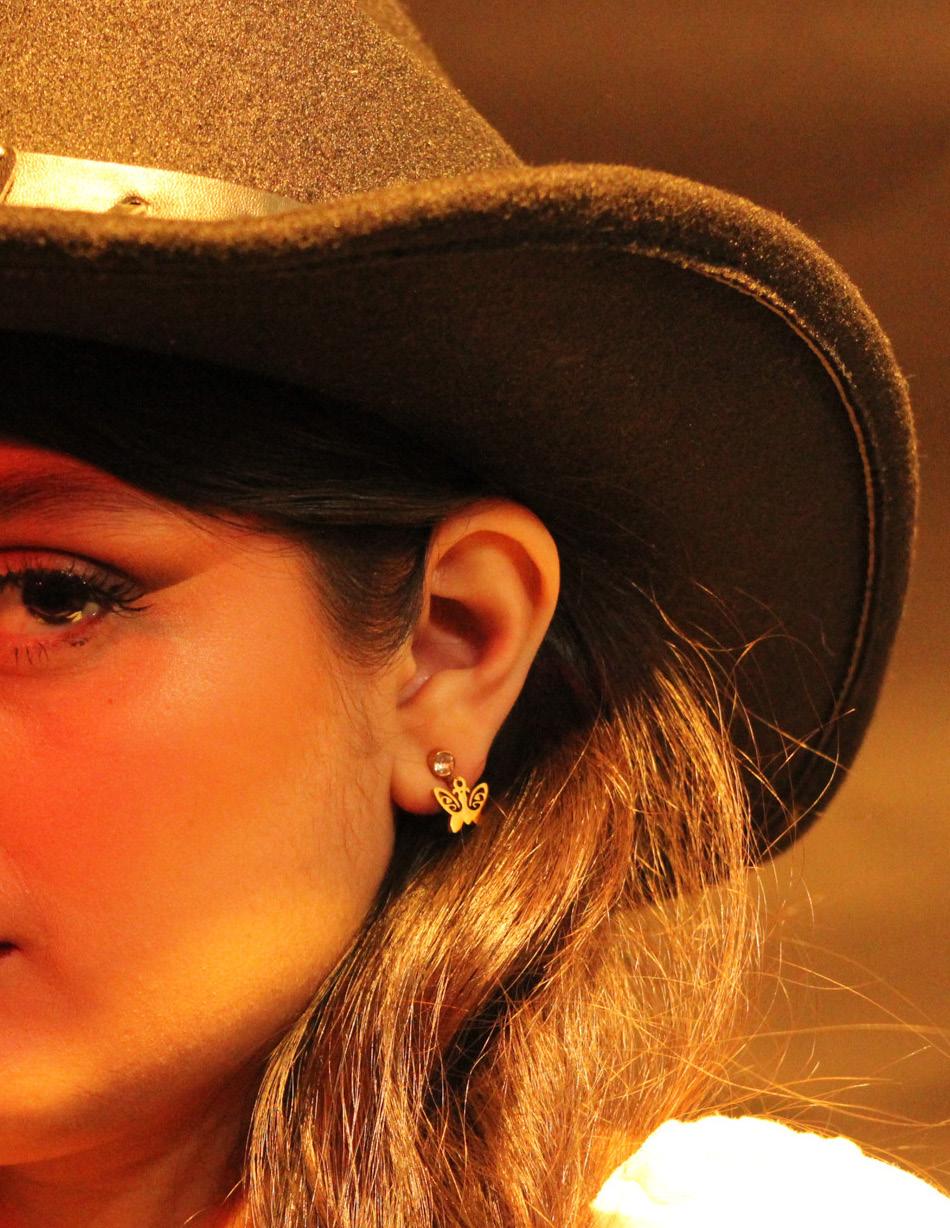
Model: Sofia Peralta
For the first couple of years, I was this content Mexican kid who missed Veracruz and would beg to go back. I missed the beautiful colorful tiles that at times adorned the buildings, I missed playing on the street with my neighborhood friends, I missed being by the ocean, and I missed my family there most of all. I loved the days where I’d be in the United States in the morning then after an afternoon nap wake up in Mexico late at night, being greeted by my tio’s smiling face the second I open my eyes. I remember one instance where I got mad at my pre-k teacher and I told her “Voy a regresar a México!” and I meant it with full earnestness. My parents and my teacher had a real laugh about it.
I can’t remember exactly when that feeling of love and pride in my identity faded away, because it didn’t happen abruptly, it happened gradually. When you lose yourself it happens bit by bit so you don’t even notice until you wake up a different person. All of a sudden I got good at English so by first grade I was taken out of the ESL classes. Then I was surrounded by these kids who mostly did not speak a lick of Spanish, and meeting kids like that for the first time I thought they were so cool. Then I would turn on our western television and see that no one on the screen really looked like me, or spoke Spanish like me (though i did find comfort in Alex from Wizards of Waverly place). Then all of a sudden the bloodlust of American forced assimilation was gnawing at me from the inside out, tearing a hole in my intestines, aimlessly searching for my heart.
When I look back at chilhoodmy growing up in the United States, mybrain feels as though it was split in half.
I was 8 years old and a walking skeleton of who i used to be, a decaying corpse of my old Mexican self, lying limp on a cold table waiting for colonial America to cut me open and examine my insides as if I was not a human being, but an alien for them to study and gawk at.
I don’t know how I unlearned all of this internalized racism forced upon me, that too happened gradually. However, if I had to pinpoint a specific moment where I didn’t want to feel that way anymore, it would have to be after my dad and I got into an argument and he told me “Tu odias ser Mexicana!” and left my room, slamming the door behind him. Seeing the hurt, confused, disappointed look on his face made me realize that whenever I’d tell them to speak English at the grocery store or complain about how all we eat is Mexican food or wish they were less strict like my white friend’s parents, I was telling them that not only do I hate myself, but I hate them too. I hate who they are. And that was the scariest realization for me because I love my parents more than air.
I had a slight advantage in overcoming this learned hatred for myself and my culture, as I was constantly surrounded by it. I grew up in a city that’s about a 20 minute drive from the border. My life was full of a fusion between real, traditional Mexican culture and tejano culture, and once I stopped restricting myself from enjoying it, I indulged in the magic of it. I decided that it was okay for me to like my country’s food, especially when served with a Texan twist. Instead of hiding in my room during the carne asadas, I went out and I danced with my papi as he twirled me around and taught me how to dance salsa and cumbia. I went to misa with my parents and let the Lord in my heart. I loved the community of people that went to those misas, súper amable siempre. I loved whenever my abuelo would come back from the ranch, boots and hat always on, bringing me a new animal to meet. One time he brought us a giant snake and I was the only one curious enough to want to take a photo with it. Oh, and I adore going line dancing to all of my favorite cumbia and mariachi hits, stomping around in my cowboy boots. There is a sense of pride I would get whenever I’d see my people with their boots and hats on, we are the original cowboys after all. Vaqueros para siempre. And of course, I would count down the days until my tio would come up from Mexico bringing delicacies you couldn’t find in the U.S, like specific candies and chips but most importantly of all: mole sauce straight from Reynosa. My absolute favorite meal. The meal I begged my mom to make all the time, the meal she would make if I ever felt down or if anything was ever wrong. This is my first time being as far away from them for as long as I am, and when I flew back down for break the first thing my ama served me was a nice hot plate of mole. I felt the comfort of home.
All around me, I saw the beauty of being Latina. How could I ever be ashamed to speak Spanish when Spanish is sometimes the only language that understands how I’m feeling? How could I ever hate my features when they are a reflection of my parents? How could I ever hate my food when it is made with so much love?
When I look back at my childhood growing up in the United States, I feel like hugging that little girl for how hard she fought to finally love herself how I love her.

“¡Ay, caray, caray!
¡Qué bonita es mi tierra, qué bonita!
linda es!”
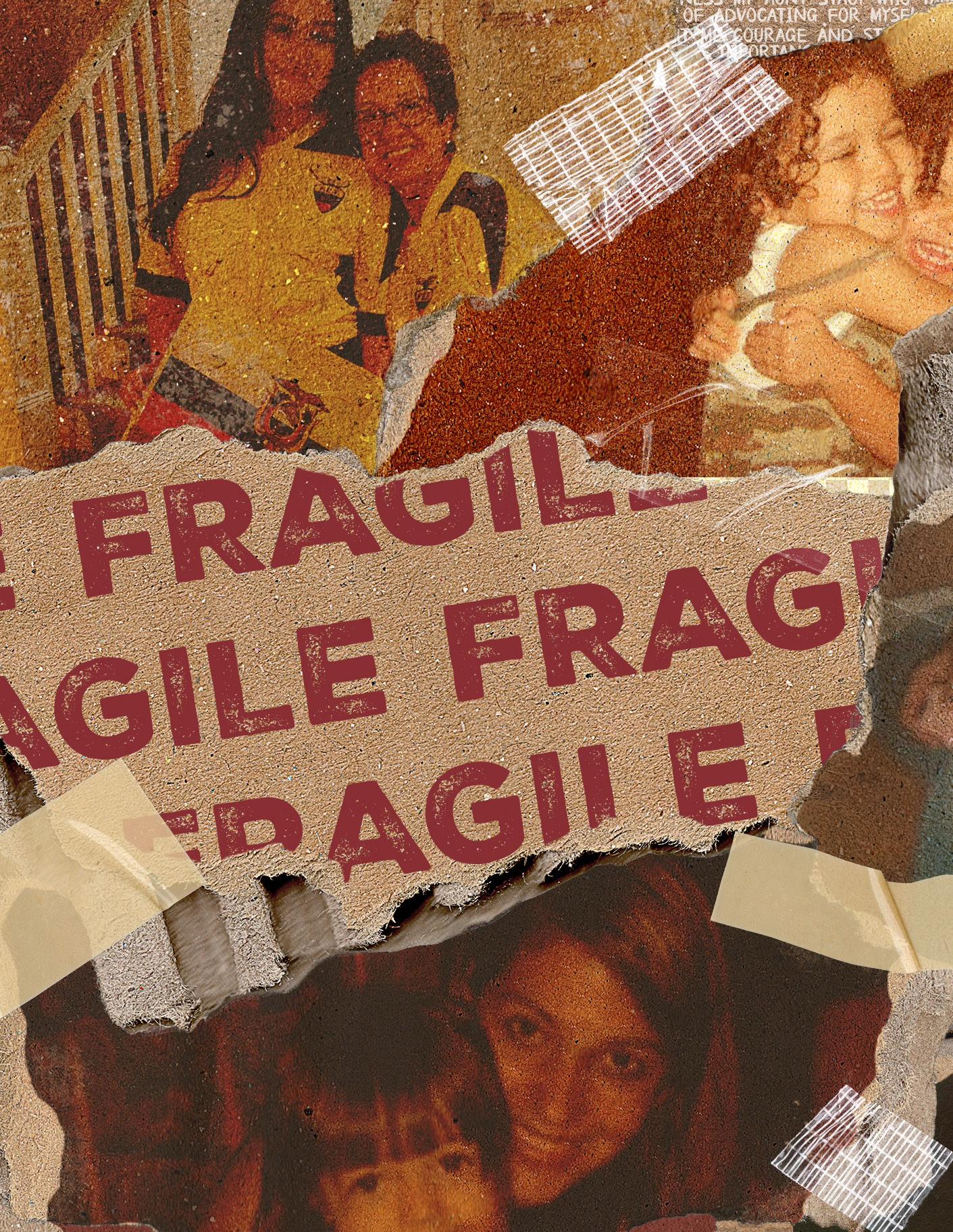
Spread Designer: Rick Li @rickishungry


Unlocking Potential in the Hispanic Community
When my mother decided to pursue a graduate degree she was met with opposition from her own family. “Why do you want to do that?” said my great grandma “You best focus on marrying a man and starting a family” she firmly declared. Although this view is regarded as traditionalist, values of complacency continue to be passed down through the Hispanic community.While it’s true that a growing number of Hispanics are pursuing higher education, relying solely on employment statistics can sometimes present a misleading picture. Despite diversity in the overall composition of the corporation, there lacks diversity among those seated at decision-making tables.
A trait of Hispanic families is a close knit family unit often seeing one another with defined roles within this structure. Support is constant at the home but when it comes to leaving the home Hispanic families are often possessive of their own favoring their children to remain close to home and retain their role within the family structure. In addition to this there is the thought of losing a member of the family who is an economic contributor. For this reason many young latinos opt to go the community college route where they will maintain their duties in the home in addition to being a full time student.
As a child, my grandparents played a significant role in shaping my social development, guiding me to embrace our cultural traditions and heritage while imparting invaluable wisdom. As a result of their influence, our bond grew remarkably close, fostering strong inter-generational relationships that enriched my understanding of our family history and values.Within cultures that place great emphasis on familial connections, the idea of breaking away from a closely-knit unit can appear unfathomable, especially during the formative years of adolesc\ence.This closely integrated familial network, tendencies of interdependency are cultivated, potentially arising from the collective reliance on one another for socialization, emotional support, and a sense of belonging. However, such reliance can also present challenges, potentially constraining individual autonomy and thwarting personal development, while perpetuating patterns of dependence that may obstruct exploration and independence.We must not feel selfish for leaving because we have a higher calling, higher responsibility as members of the Latino community
In the wisdom handed down through generations on my father’s side, there’s a cherished saying that resonates deeply,“When you grow up you want to be pushing the pencil not pushing the broom.”To ‘push the pencil’ embodies not just the act of writing, but the authority to shape your own narrative, rather than being relegated to the task of pushing the broom, a symbol of toil and subservience. .
In a competitive society, our cultural practices may hinder our prosperous development, necessitating confidence in entering higher academia where our peers may not resemble us. Coming from a background of laborers and farmworkers, my grandfather and his sister were the only Hispanics facing ridicule and alienation from their peers. His unprecedented determination led him to become the first person in his family with a bachelor’s degree and later a Jurisdoctorate. As a people we must welcome the opportunity education provides in straddling the social pyramid.If no one in your family attended college before, taking a leap of faith in the name of education and betterment is the first step in defining the Latino people as a prosperous and well connected community. Furthermore, to truly excel, we should vigorously pursue admission to esteemed schools and actively seek career paths that allow us to assume positions of ownership, thereby empowering us to make impactful decisions
Additionally, I envision a future where a greater number of Latinos are holding prominent positions of influence extending beyond individual achievement into the establishment of a strong network at the pinnacle of various industries. This network would not only serve as an exemplar of our collective success but also as a vital resource for the next generation of aspiring Latino professionals. Embedded within the saying “Your first job is because of who you know, and your second job is because of what you’ve learned” lies a profound truth about the dual importance of networking and skill development in career progression. By harnessing the power of our individual talents and resources, we have the opportunity to forge a network that serves as a catalyst for the success and empowerment of others within the Hispanic community. Together, we can create pathways that enable individuals to realize their full potential and thrive in their chosen endeavors.
Taking initiative starts with each of us. I encourage every one of you to initiate change and break free from the grip of com placency. Take a step in the right direction for yourself and the greater good of Hispanics across the country. As students at a prestigious university we are all primed to make a splash in whatever field we choose. We should be proud of how far we have come yet understand there are greater obstacles to overcome.I extend an invitation to the readers of this magazine to consider the greater ramifications of your actions and to not forget where you came from when you make it.

Photography: Devon Mitchell @_devon.mitchell_ & @mediabydev
Makeup: Aree Clarke @luxxaree & @scorpi.000
Model: Arianna Savino
Echos of Ecuador: An appreciation for Ecuadorian Culture Amidst Crisis.
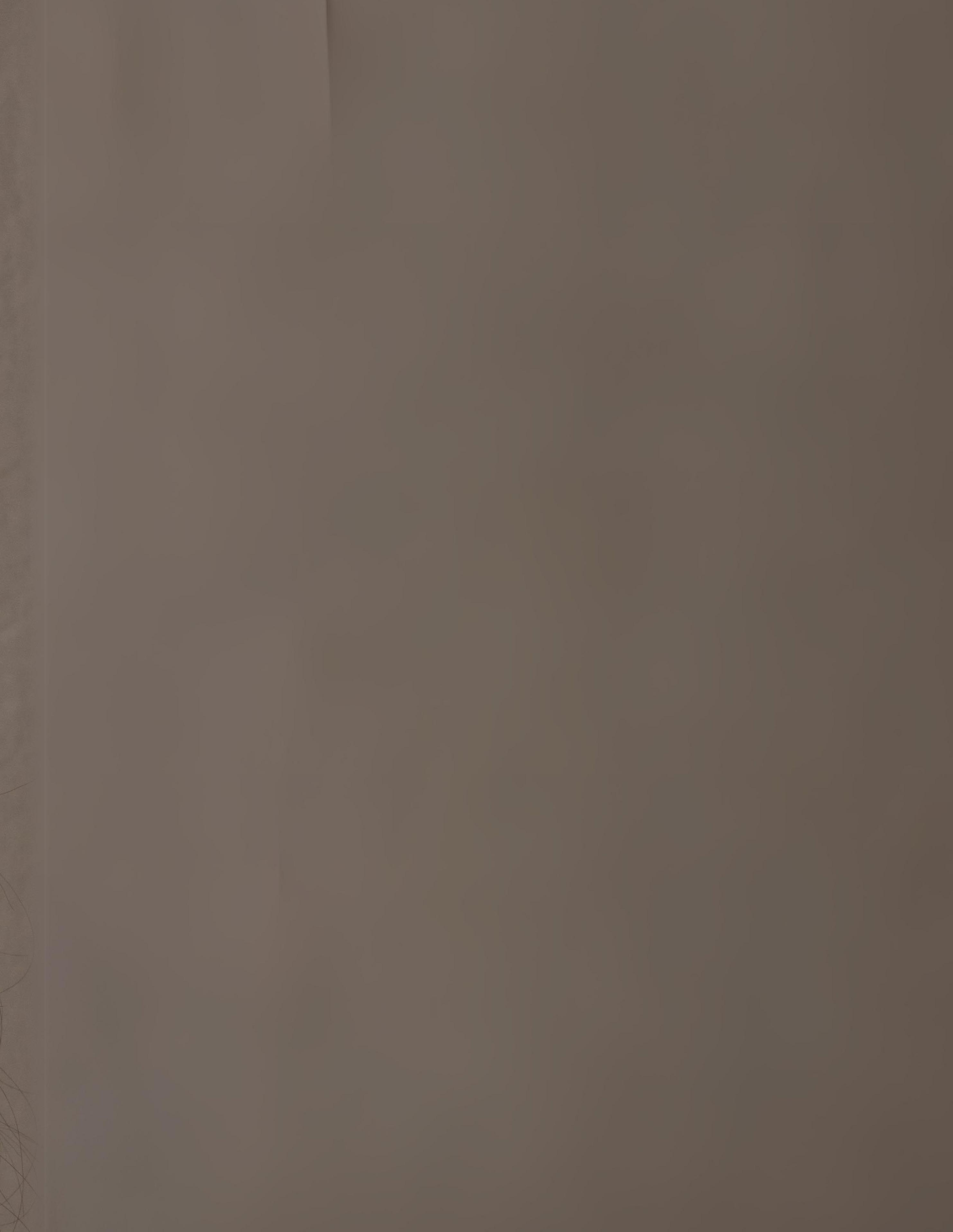 By Arianna Savino
By Arianna Savino
From the sun-kissed coast of the pacific, to endless peaks of rugged highlands, and the vibrant pulse of the city, throughout history, Ecuador has been a noteably passionate nation. In more recent times, crisis has, unfortunately, been emerging, and citizens have been forced to faced times of adversity.
Regardless, Ecuadorians have yet to let themselves get shaken up by such times, instead, they stand resilient. This, country, rich with culture, consists of a unique, un wavering, unyielding spirit. Ecuadorians are driven, proud people, we are self-assured in our identity. But most importantly, we are a family. A value so deeply instilled and honored thatn not even the most evil of souls could ever rob us of that fact; nobody can.
Despite the endless efforts to address the drug trafficking issue in Ecuador, authorities face rigorous challenges. The current drug crisis regards the geological position of Ecuador, being that it is in a transitional location between Colombia and Mexico. Its extensive coastline has facilitated operations between drug cartels and other organized criminal groups who have taken advantage of Ecuador’s location.
These individuals ruthlessly attack innocent bystanders, people of their very own nation. On January 7, 2024, several masked gunmen hijacked a news station in Guayaquil, leaving several begging for their lives and others injured.
Viewers of a live TC Television broadcast watched anchors be terrorized by firearms, explosives, and sticks of dynamite. This spiked President Daniel Noboa to declare a state of emergency and declare war on armed gangs.
In the face of such violence with rapid escalation, Noboa’s words underscore the importance of fighting as one strong, united nation. As a country with dense virtues, Ecuador is the home of endless traditions and unique cultural aspects. As a land steeped in rich traditions and vibrant culture, my Ecuadorian heritage has provided me with unique experiences that I resonate with deeply.
Heavily influenced by its indigenous heritage, our music, art, cuisine, and customs reflect just a glimpse of our identities. Music serves as a universal language as vibrations are heard nation-wide.
Ecuadorian artists, inspired by their deep-rooted connection to their homeland, tend to express their appreciation for their country through vibrant songs. I grew up constantly around the distinct sound of a Cumbia CD. Originated from Colombia, yet embraced by all South America, the lively sound holds a special place in Ecuadorian culture.

I have endless memories repeating Pastor López’ track filling the air as I played under the summer sun with my cousins. It is thanks to my grandfather that we have the same appreciation he has for music, which is a significant part of our culture. This is where Cumbia plays a sentimental role in my life; it is not just a melody, but the heartbeat of cherished moments that define who we are, who I am. Moments in my childhood that would not have been the same had they lacked the high-spirited tunes of South American music.
As college students, especially, it is common to crave home-cooked food often. For me, that craving would often be fulfilled by enjoying some of my grandmother’s delicious empanadas. Empanadas con queso, or empanadas con carne, a comfort food for me, no doubt.
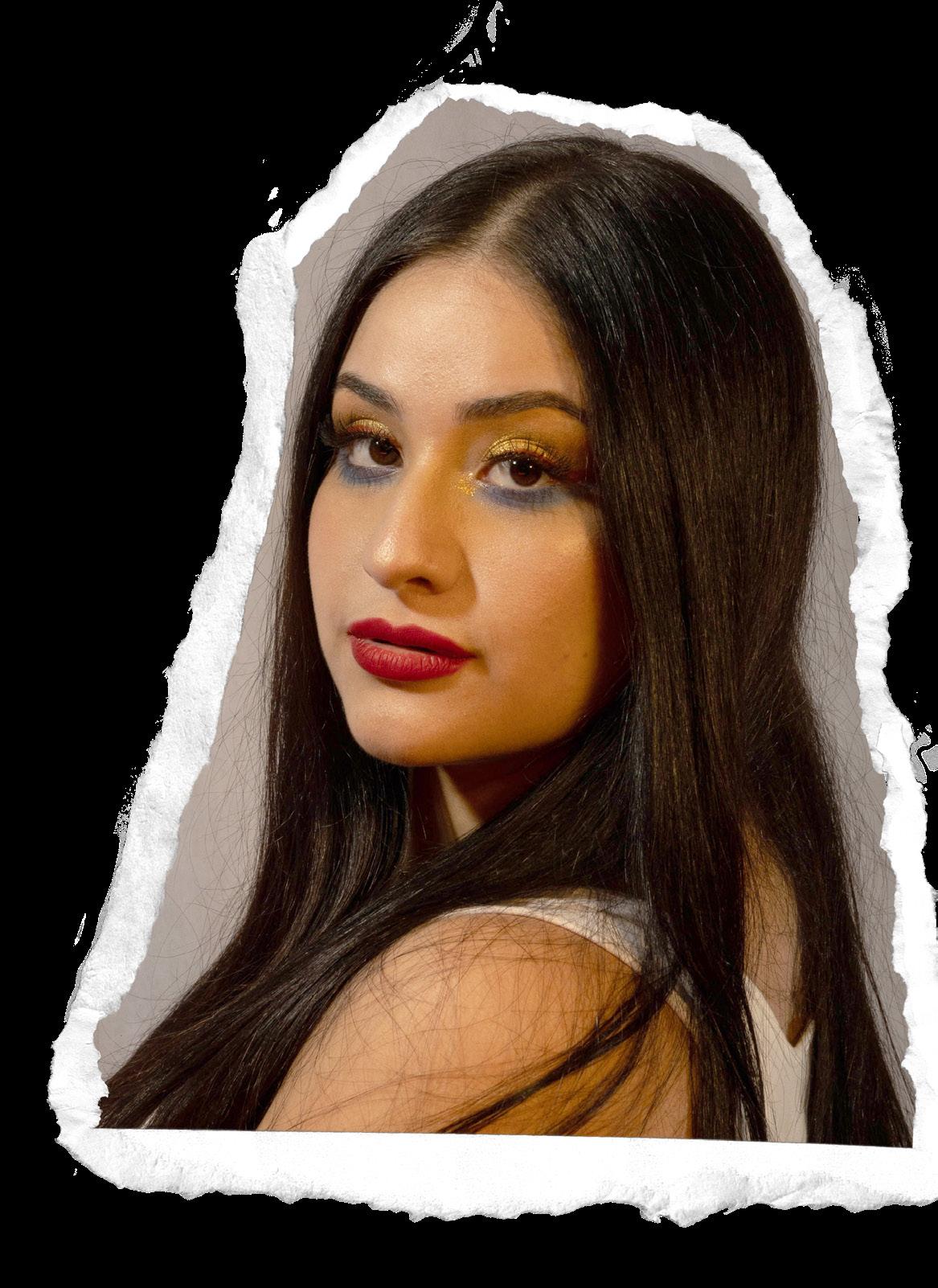
However, it's also a shared memory amongst many South Americans. Making empanadas is extremely tedious; it requires patience and practice. Nevertheless, it’s a labor of love I eagerly took part in with my grandmother, cousins, and brother. Our time in the kitchen was filled with laughter and heartfelt connections, creating memories I hold dear. Likewise, on a typical summer Sunday morning I would wake up to the sound of my father freshly preparing ceviche; a refreshing summer seafood dish. Like music, food in my family is more than just a symphony of flavors. Behind every plate, behind every dish, contains unconditional love from the person who prepared it.
Ecuador has beautiful, captivating beaches that offer an experience like no other. Unlike the calm atmosphere often found on beaches in the States, Ecuadorian beaches are bursting with activity. This is because of the never-ending vendors eager to offer you braids, bracelets, ice cream, street food, the offerings are endless. As a little girl, witnessing this was nothing like I’ve ever seen. The vibrant scene unfolding on the shores was a contrast to the beaches of Long Island I was accustomed to. I was immediately swept up in the excitement as soon as I stepped on the sand. I would eagerly join my cousins in getting matching braids or perhaps even an airbrush tattoo, with my mother’s occasional approval. With only a humble five-dollar bill, I could treat myself to a snow cone, a handmade dress, and if I was lucky, possibly even a pair of sunglasses, all from the vendors lining the Salinas beach. These vendors who have so little radiate a wealth of happiness that is infection. On the shores of the beach is where I learned the valuable lesson of “less is more.”
Something so simple brought me immeasurable joy.

Although these moments in Ecuador during my childhood are truly sacred, my favorite must be New Years Eve. The symbolic way to say farewell to all your hardship from the old year is done through burning an “Año Viejo”: a paper mâché dummy. This is our way of welcoming the new year with fresh aspirations, goals, and hopes. The dolls of often popular characters are sold locally in every town, representing negative energy and bad luck from the previous year. On New Years Eve, typically at midnight or shortly after, the community comes together to burn their Año Veijos, but only after swallowing down twelve grapes and making a wish on each (of course). Accompanied by fireworks, champagne showers, music, and cheering, this is truly an experience like no other. Flames burn in the night sky as the Año Viejo tradition unfolds and you simply feel a sense of purpose. The atmosphere erupts in utter bliss, symbolizing the Ecuadorian strength to leave challenges behind. This relates to the current emotional state of Ecuador at this very moment: despite facing tough times—we know we can overcome anything. Being exposed to such rich culture at an adolescent age is something I value as a treasure. I aspire to share this legacy with my future children, as my own childhood would have been vastly different without it. It has shaped my identity but made me develop a strong connection to my heritage's richness. Tengo esperanza de que Ecuador vuelva a su estado original. Viva Ecuador, siempre.





if you didn't read our first issue wyd
Dear Reader, Welcome or welcome back! If you’ve read Del Sol’s first issue, you may recognize my writing from the LatinX Barbie piece. If you haven’t read Del Sol’s first issue, you NEED to go check that out. But… I’ll make your life a little easier and give you the rundown. I previously wrote a piece called “The LatinX Barbie,” referencing the relationship between Latin culture and soccer, specifically our love for Messi. When explaining this connection, I pointed out how Messi, now wearing his pink InterMiami jersey, was almost like the Latin community’s version of Barbie. Relating the chaos of Messi fans to the uproar at the latest release of the Barbie movie. This will make more sense once you read the first issue, *cough cough*. Yet, one of the most special parts of this piece was when I spoke about my dad.
My Argentinian dad and his connection to Messi, his connection to soccer, and my connection to him.
So, as I thought about what I wanted to write about next, the first thing that came to mind was my mom. Specifically, our inseparable relationship. I wanted to share with the world how she and the women in my life worked together to handcraft me into who I am today.
You see, my mom is quite literally the reason I am who I am. There is no me without my mom, no Sunny without Sam. First, being obvious—she went through one of the most beautiful, yet hard, human experiences one can have for me. Growing me for nine months, creating my nutrients herself for quite some time to follow my birth and then raising me for…eternity?
Now for the not as obvious.
Since the time I can remember we have been connected at the hip, ‘BFFs for life.’ From our matching dresses when I was five to matching piercings on my 15th birthday.
My mom has devoted a great chunk of her life to me and never has had any shame in admitting it. She’s managed to honor herself and her pursuits but at the end of the day, she’ll say with pride I am her priority.
What makes this so special is that she’s my priority too. This isn’t us being dependent on each other, this is us truly being best friends.
If you’ve ever had the pleasure of meeting my mother, you’d know that she has always been unapologetically her own person. She’s incredibly independent but also probably one of the easiest people to have a conversation with and feel connected to. She has a gift of warm energy, in the way in which she doesn’t have to say or do anything for you to feel like you’ve loved her for a million years.
These are some of the traits I like to hope she’s passed down to me as well. I’m no doubt her twin in the sense of looks but I have that independence, drive, and love for connecting with others too.
On the other hand, however, we’ve never tried to force ourselves to morph into one. Rather we can gladly confess: we are two puzzle pieces which make up a greater image. We are our own people.
We are human.
We aren’t always perfect but those “flaws” in our relationship are what connect us more. I’m often asked,
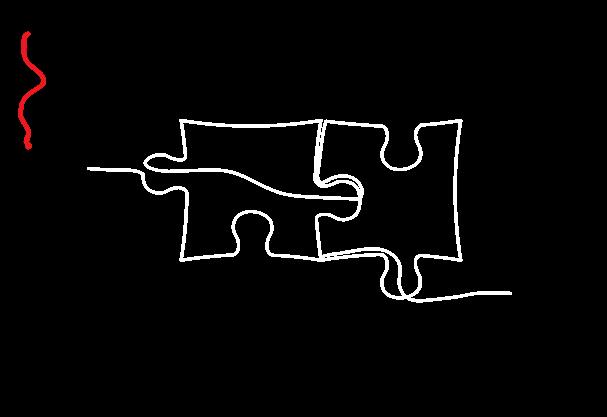
“How are you so close with your parents?
“How are you and your mom so open with each other?”
There are so many answers I could give to these questions but I think the most real, unfiltered and truthful thing to say is this:
We remain in such a healthy relationship because we admit we aren’t perfect.
That’s what’s important about our connection. That’s one of the most beautiful parts.
Although my mom is amazing, she’ll be the first to admit that she’s learned a great share of lessons from me. Although we are best friends we still bicker and roll our eyes at each other from time to time. Although we are inseparable we still need our moments of peace and quiet. Yet, none of that affects us because we have no problem communicating when we have a moment of annoyance or hurt caused by the other.
I’ve been able to express any feelings to my mom with no issue because the respect between us has always been mutual. In some regards, I’ve always been treated as an adult with my own thoughts and freedoms. Allowing me to grow as my own person and have the support from my parents every step of the way.
As a result of this, I’ve never been scared to tell my parents anything…like anything. Growing up I was reassured that I had my parents’ full trust as long as I was always honest. I can confident ly say that there hasn’t been one instance where I’ve lied to my parents. Not one.


And there’s never been anything I’ve filtered from my mom. When I had my first kiss, I ran to find my mom as she was the first person I wanted to tell. When I had my first sleepover with a boy, I texted my mom at four in the morning to let her know where I was and what was going on. Even after moving to another state for college, my mom has gotten countless late-night texts and early morning calls about the never ending adventures I’ve been on.
Nevertheless, now that we are on the topic of college, you, like every other person in our lives, may be wondering if my moving 1,418 miles away from my mom was hard on us.
The simple answer is no. I know right!? How could we be so close and not suffer from being so far apart? That’s just it, we are so connected. So close. That distance didn’t impact our connectivity. It honestly feels like at times like I’ve never left her. I feel her presence. We sense each other’s stress, happiness, highs and lows (no seriously, I can't even count how many texts we ve sent at the exact same time).
Sure, it was an emotional time moving away. There were some adjustments that needed to be made and some moments of realization. Yet, above it all my mom was happy to see me grow and thrive.
Many of those who know our relationship would express how worried they were for my mom. They’d question what she would do with her time, how she’d cope. Although it came with great intent, I found much offense to these inquiries because what they didn’t realize was that my mom and I could survive away from each other. They assumed I was my mom’s whole life, but she’s so much more than just my mom.
I may be a great aspect of my mom’s life, intentionally, but I was never her whole life. I understand how it may seem this way but my mom has never altered who she is for someone else.
Let that sink in because that’s the biggest takeaway.
Time and time again, my mom has reminded me to never lose sight of who I am, especially for someone else’s advantage. Even after marrying my father, she reminded herself to never lose her individuality or independence. My parents love each other very much and have a beautiful relationship but they still are their own people.
Due to this lesson I ve unapologetically always been myself. I ve embraced my distinct characteristics, just like my mom has.
In addition to my mom there have been many other influential women in my life.
My grandma Mimi who taught me confidence and self love.
My aunt Sandy who taught me courage and strength.
My aunt Donna who taught me the power of kindness.
My aunt Risa who taught me the beauty in the expression of art.
My aunt Stacy who taught me the importance of intelligence.
My aunt Rebecca who taught me the significance of advocating for myself.
My aunt Heidi who taught me about selflessness and being there for the family.
To my teachers who built me up piece by piece.
To my best friends who aided my confidence, wiped away my tears and made my stomach hurt with laughter day after day.
And to my new sisters of Kappa Kappa Gamma who have been there for me in every instance and build me up everyday.
Plus so many more.
These women taught me the unity in womanhood. They taught me the importance of having each other. These women made me who I am.
To my future daughter (or daughters?), I promise to do for you what these women have done for me.
As each generation evolves, we as a community need to vow to build women up in ways I was able to experience.
To you, the reader, no matter what you identify as or what you’ve experienced in the past I hope you take this next vow for yourself. I hope you take from this the most important lesson I’ve ever been taught…
The cheesiest clique.
Something is so overused, we forget it has meaning. Be yourself.
Embrace who you are. And never, ever let someone take away YOUR individuality.
- Sunny Suaya
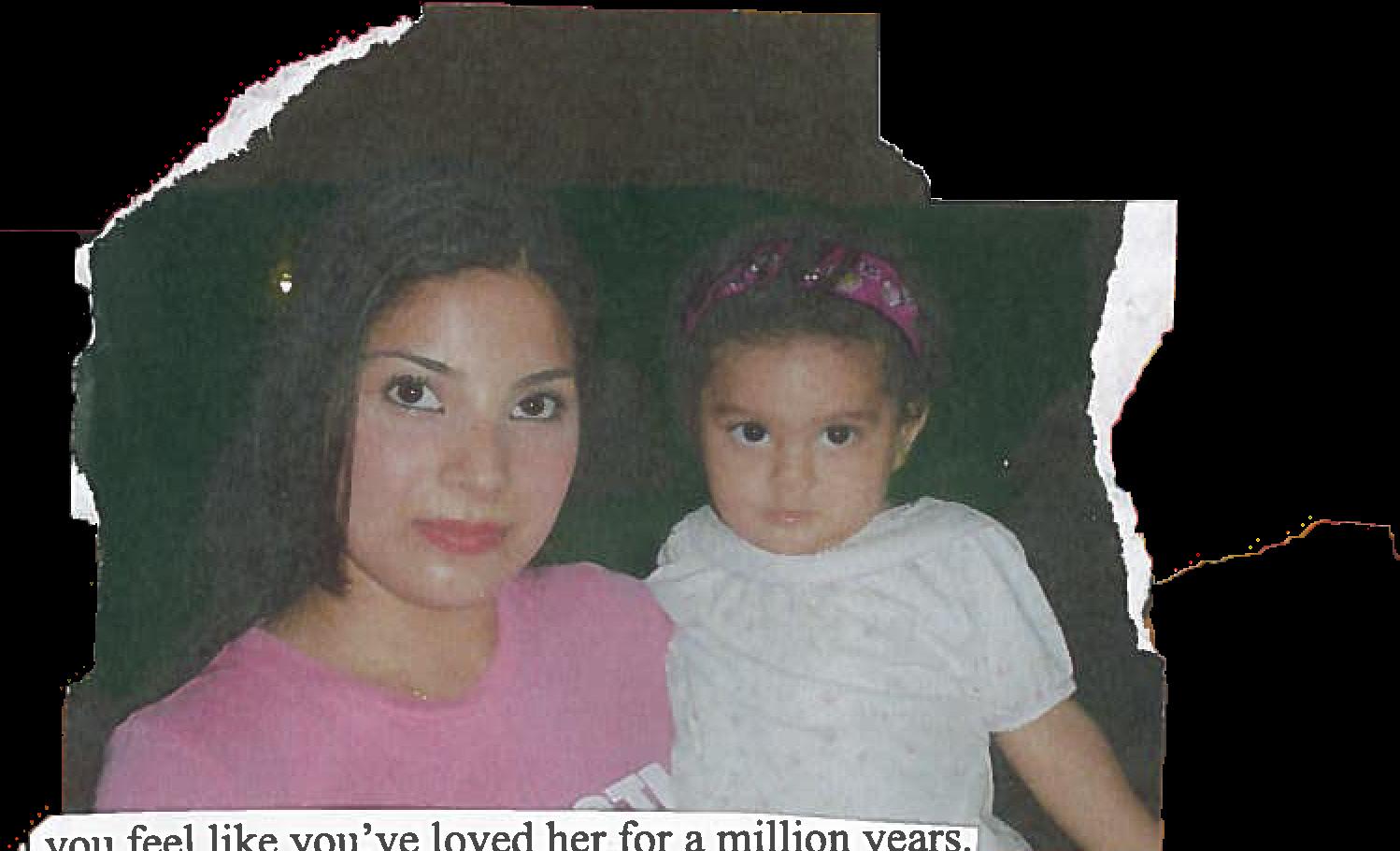
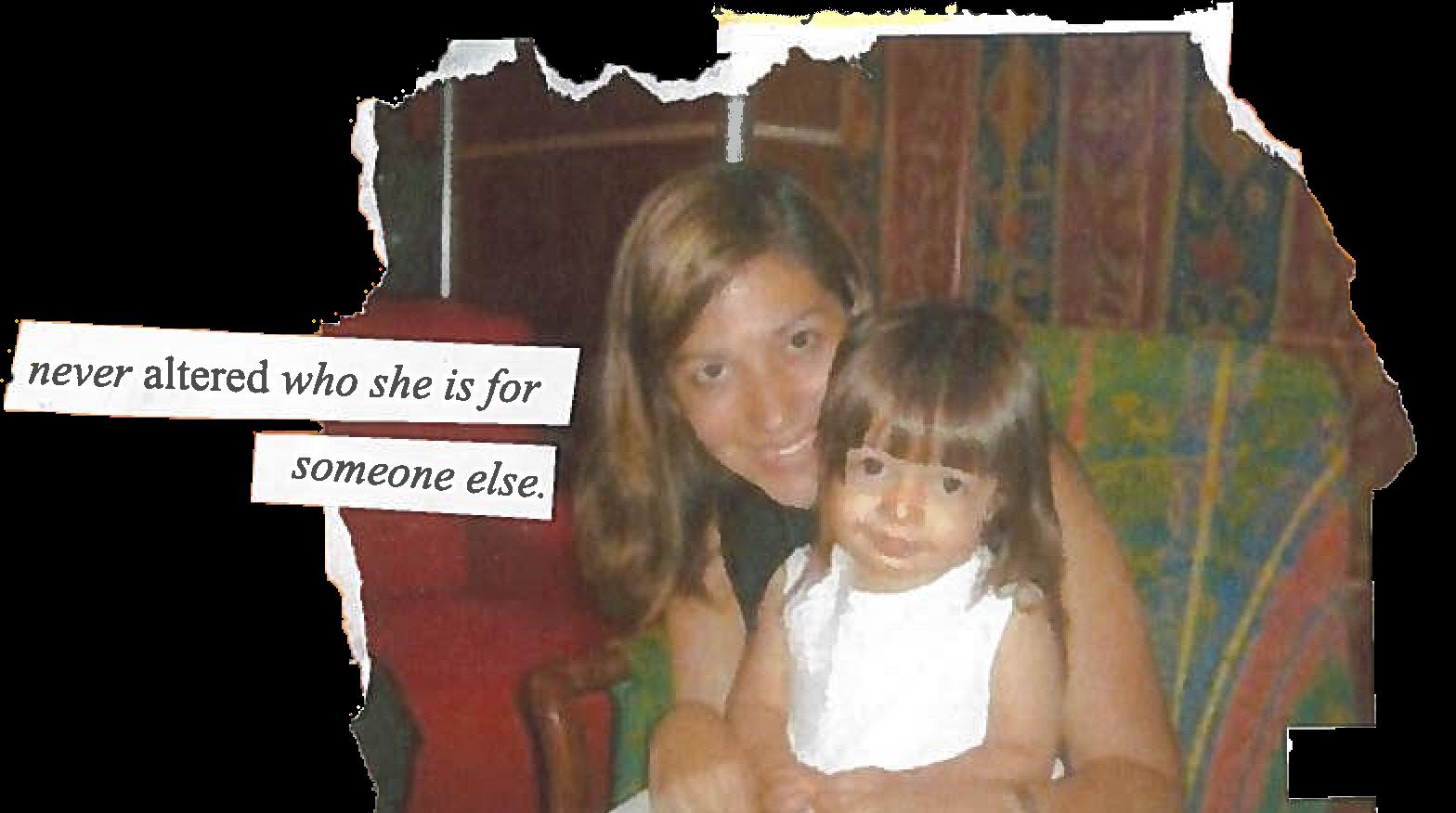

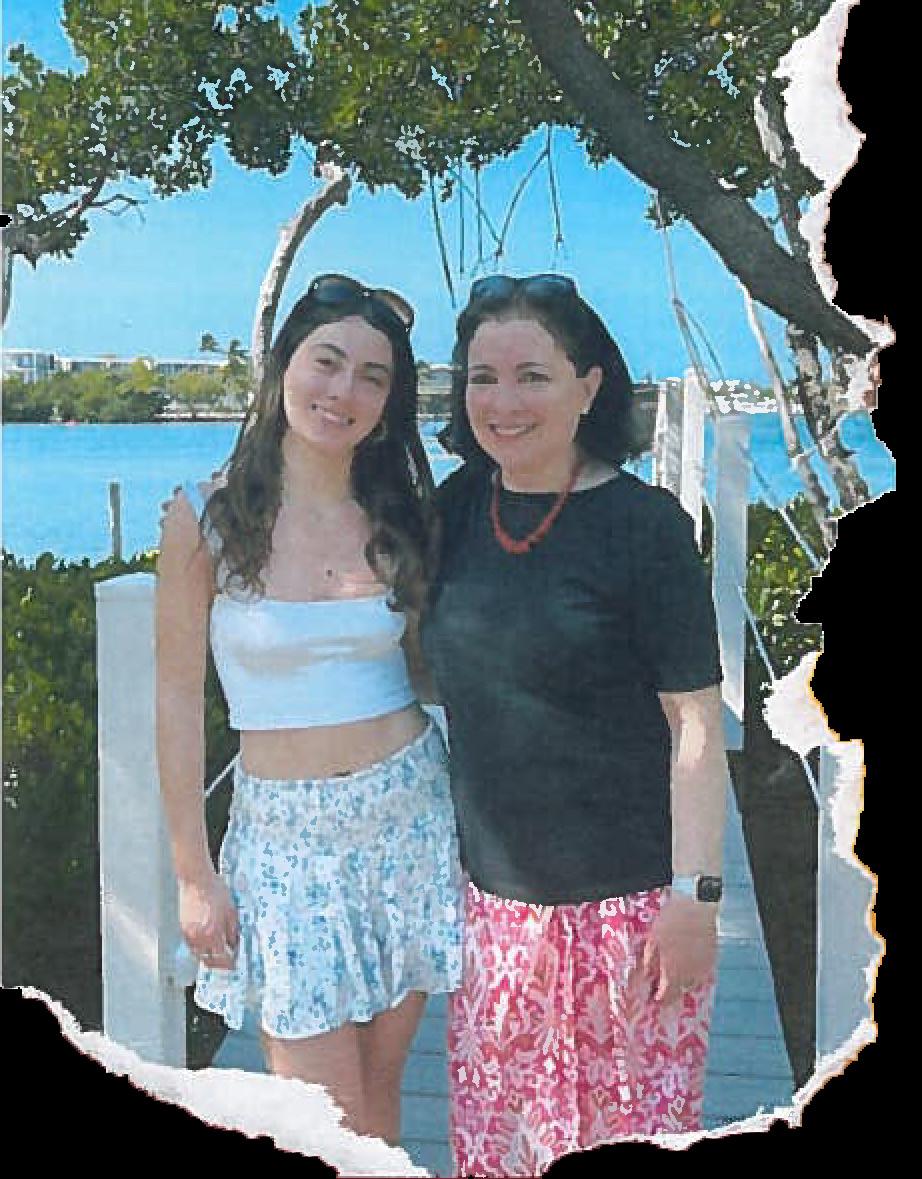
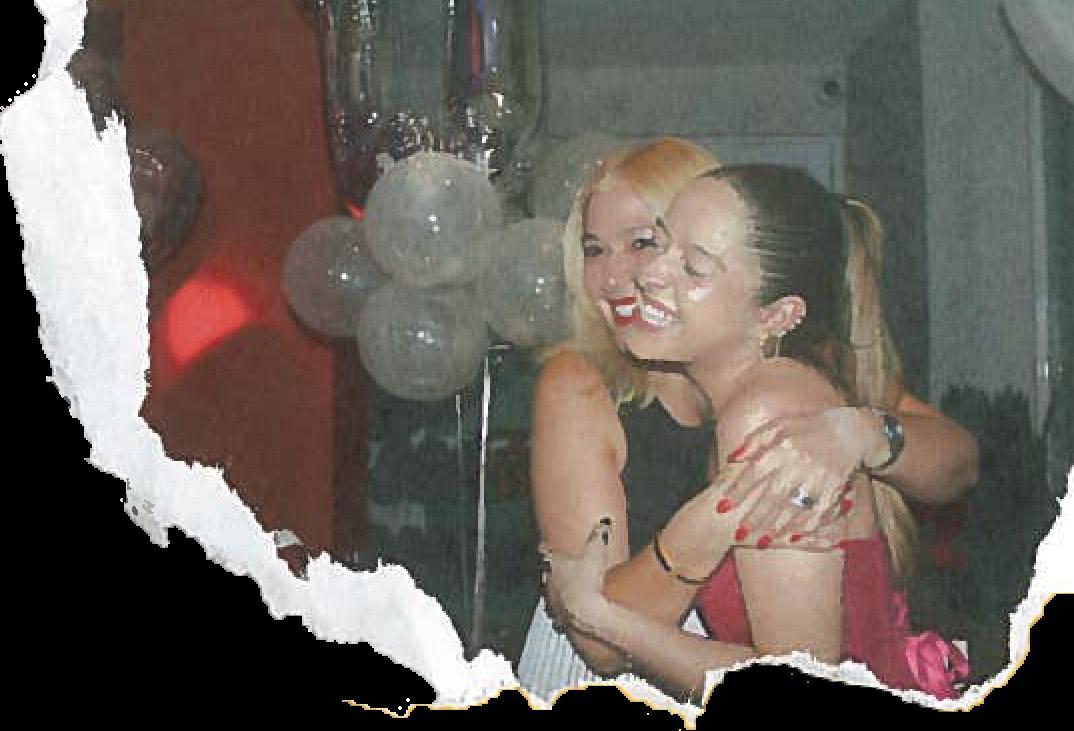

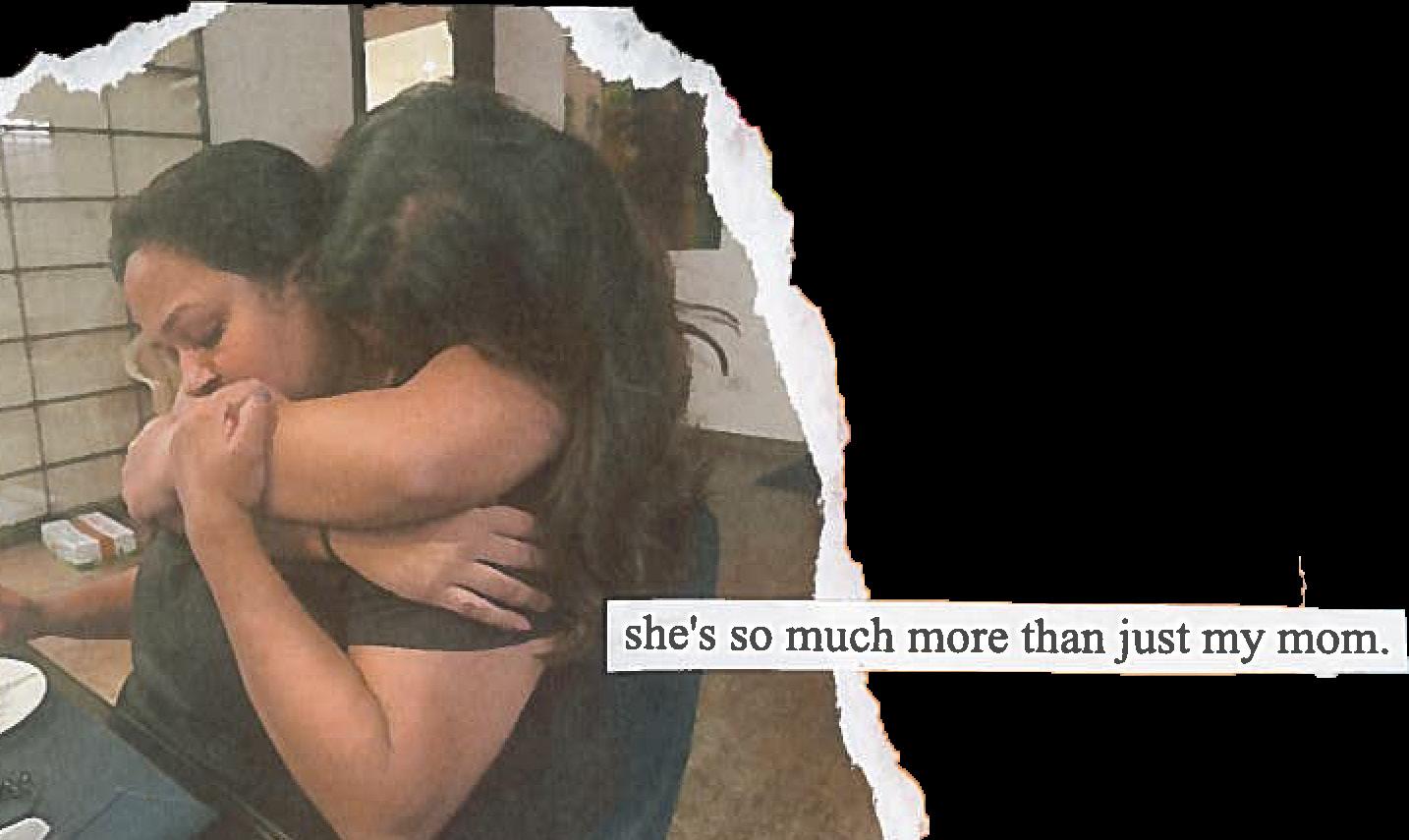

Photography: Devon Mitchell @_devon.mitchell_ & @mediabydev and Isabella Flores @isabellamfloress
Makeup: Aree Clarke @luxxaree & @scorpi.000
Model: Sofia Peralta
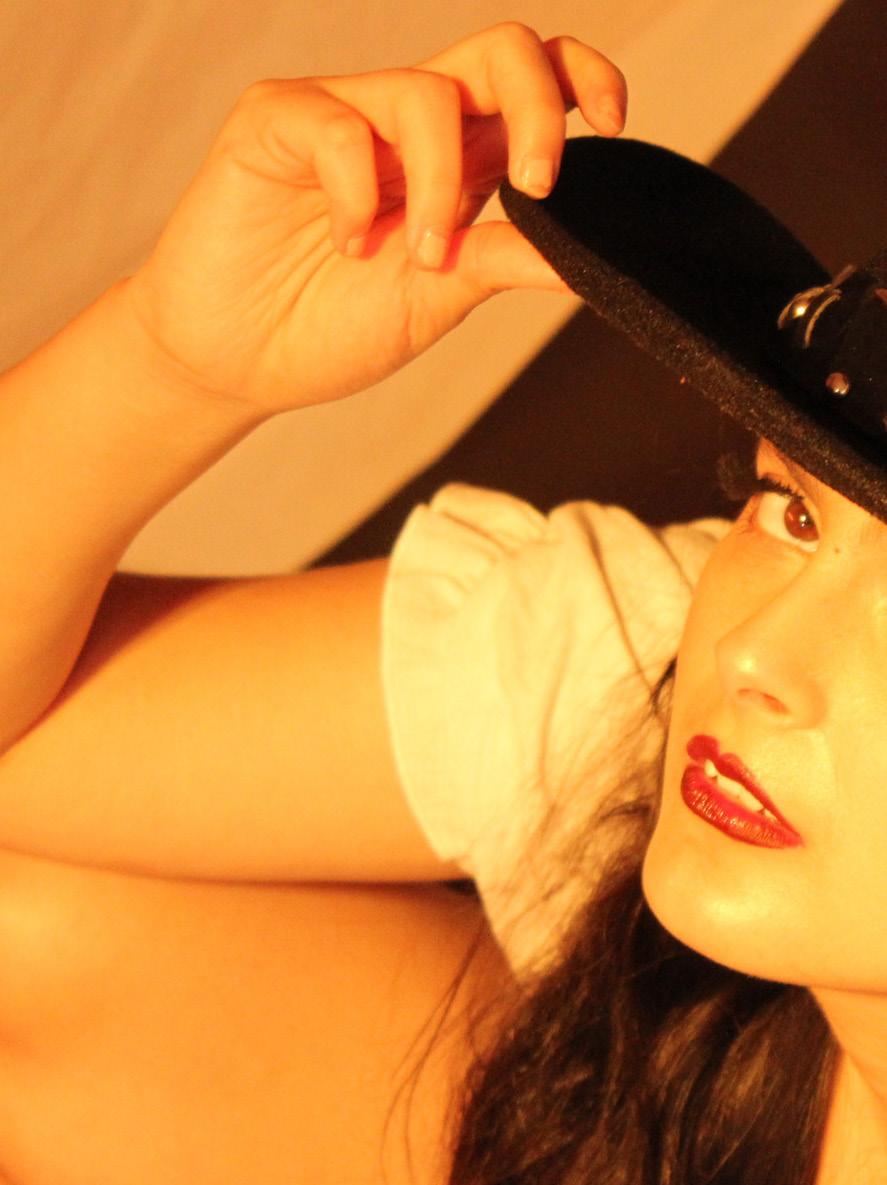
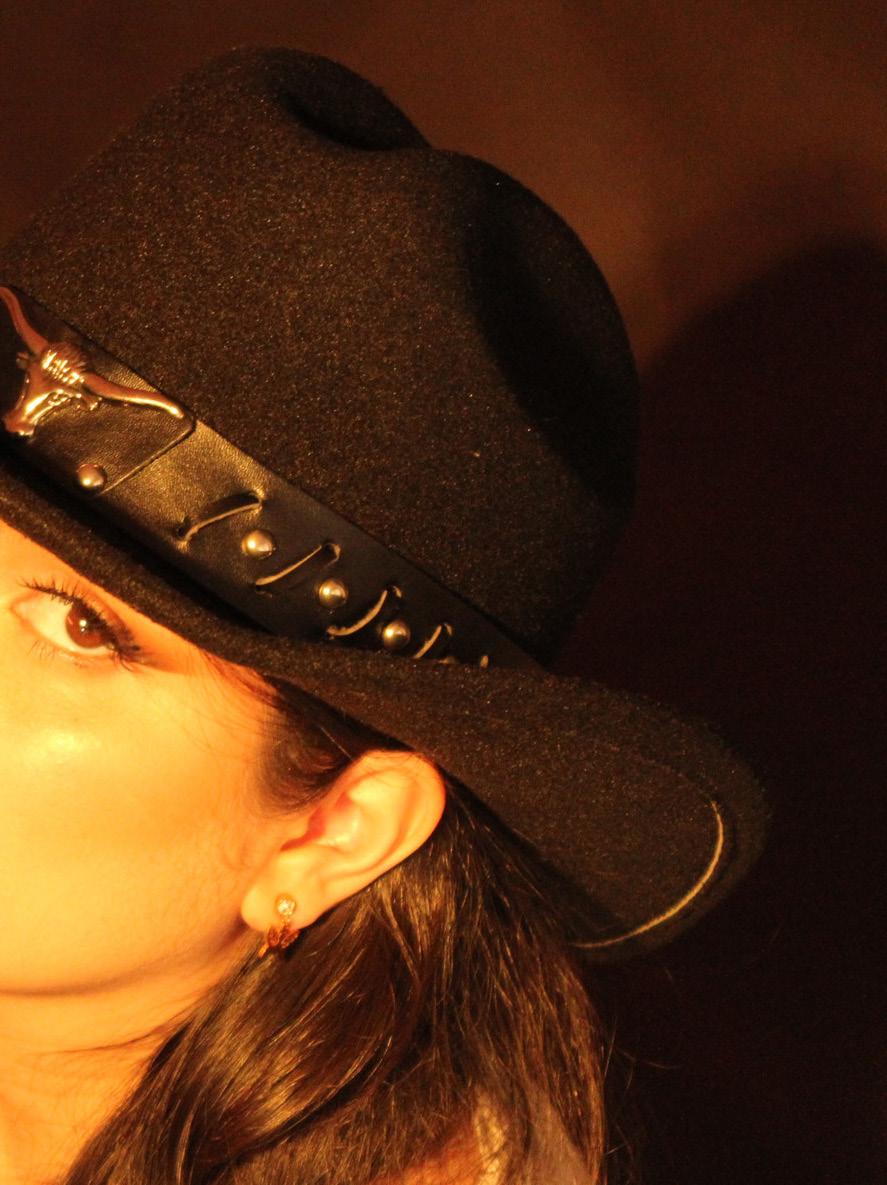
Who Am I?
My whole life society told me I was different from the rest because I came from an immigrant household, “you have different traditions, ideals, lifestyles” You're not one of us and that was the end of that story. The story becomes complicated when your family tells you you're not really Hispanic because you weren't born in their home country and you're Americanized. That leaves you with the question of where do I stand… when You're too American to be hispanic... When You're too Hispanic to be american.
Now, the question I raise to the panel is what are the requirements that will grant you the authentic seal of approval?

You have to be from Hispanic or Latin origin.
The CDC states that it's one of the qualifications. But do I have to be born in my family's native land or is being a daughter of immigrants enough?
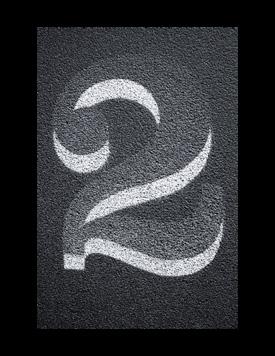
You have to speak the native language
But what if you can't speak it well or at all because your parents didn't teach you?

Having darker skin and features are a clear indication of your race.
But.. I have a lot of families that are lighter in complexion, does that make them anymore hispanic?
The reality is there is no such thing as a requirement , it doesn’t matter whether you can speak the native language, if you know all the traditions or whether you follow the lifestyles of a native. If you consider that a part of your identity, SO BE IT. It took me years to realize that no one had the right to tell me that I’m more or less of my culture based on their standards. The only person that can give you the authentic seal of approval is yourself. Express yourself and your identity how you like because at the end of the day who really cares.
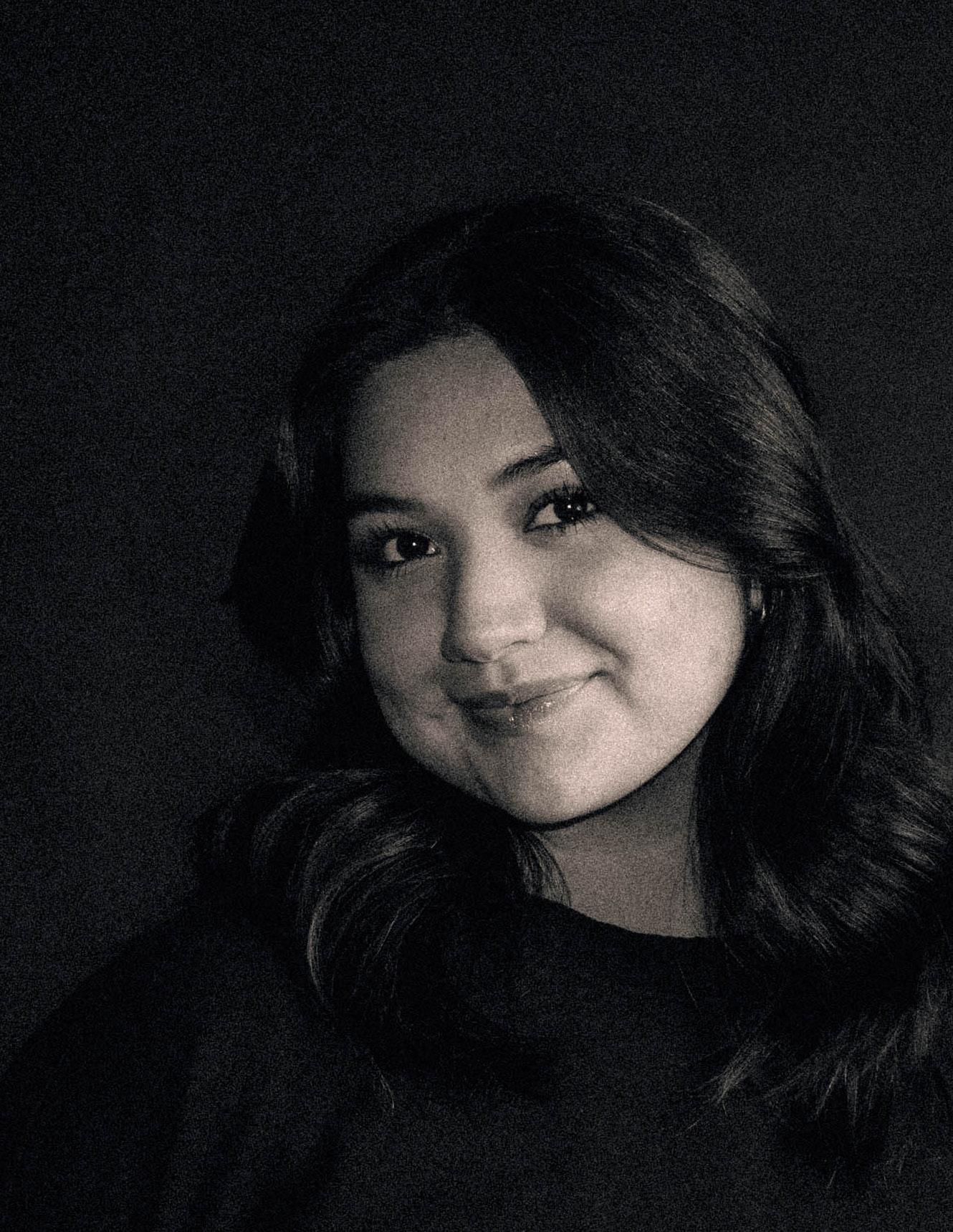
by Myrka Dominguez

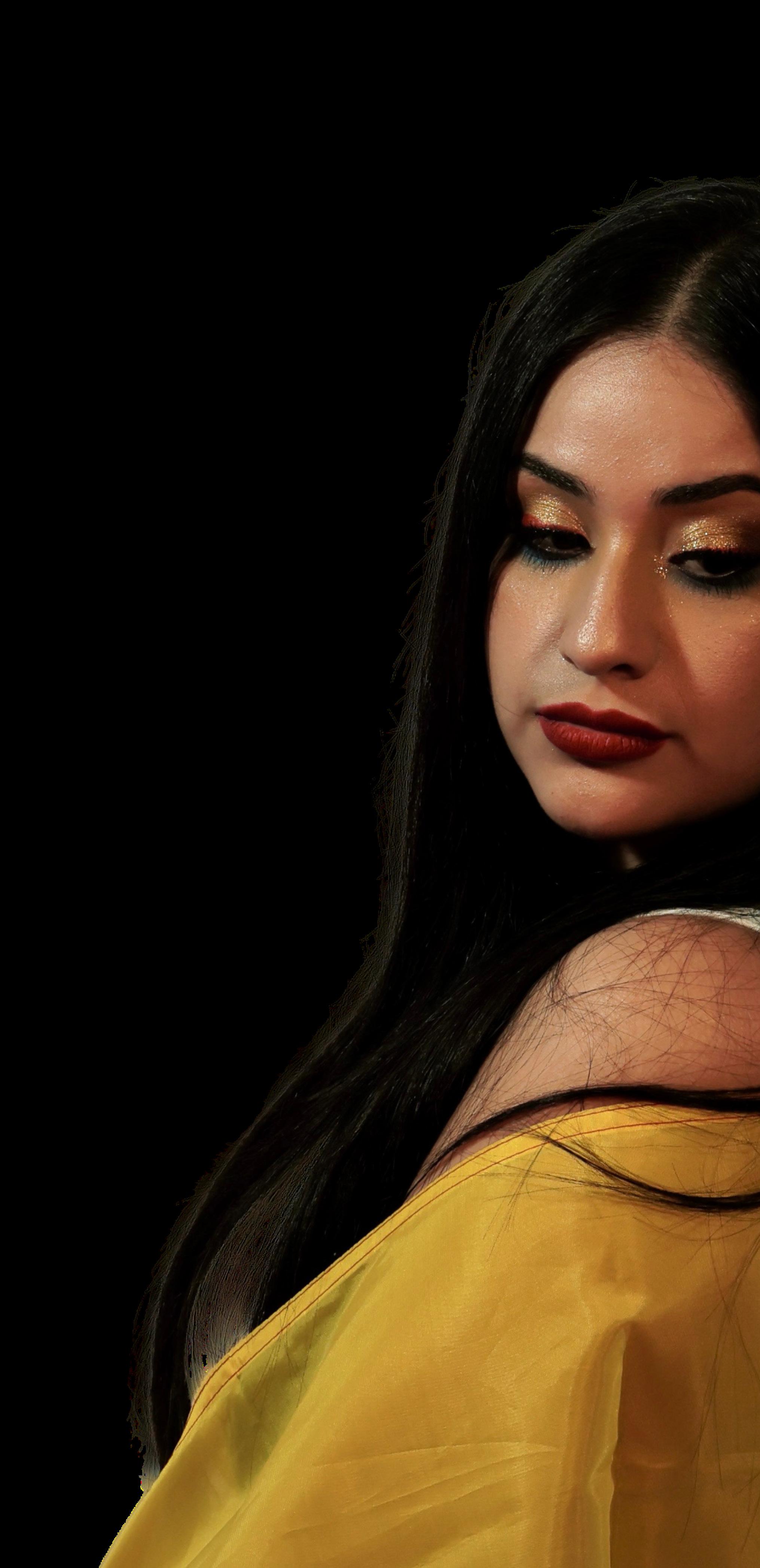
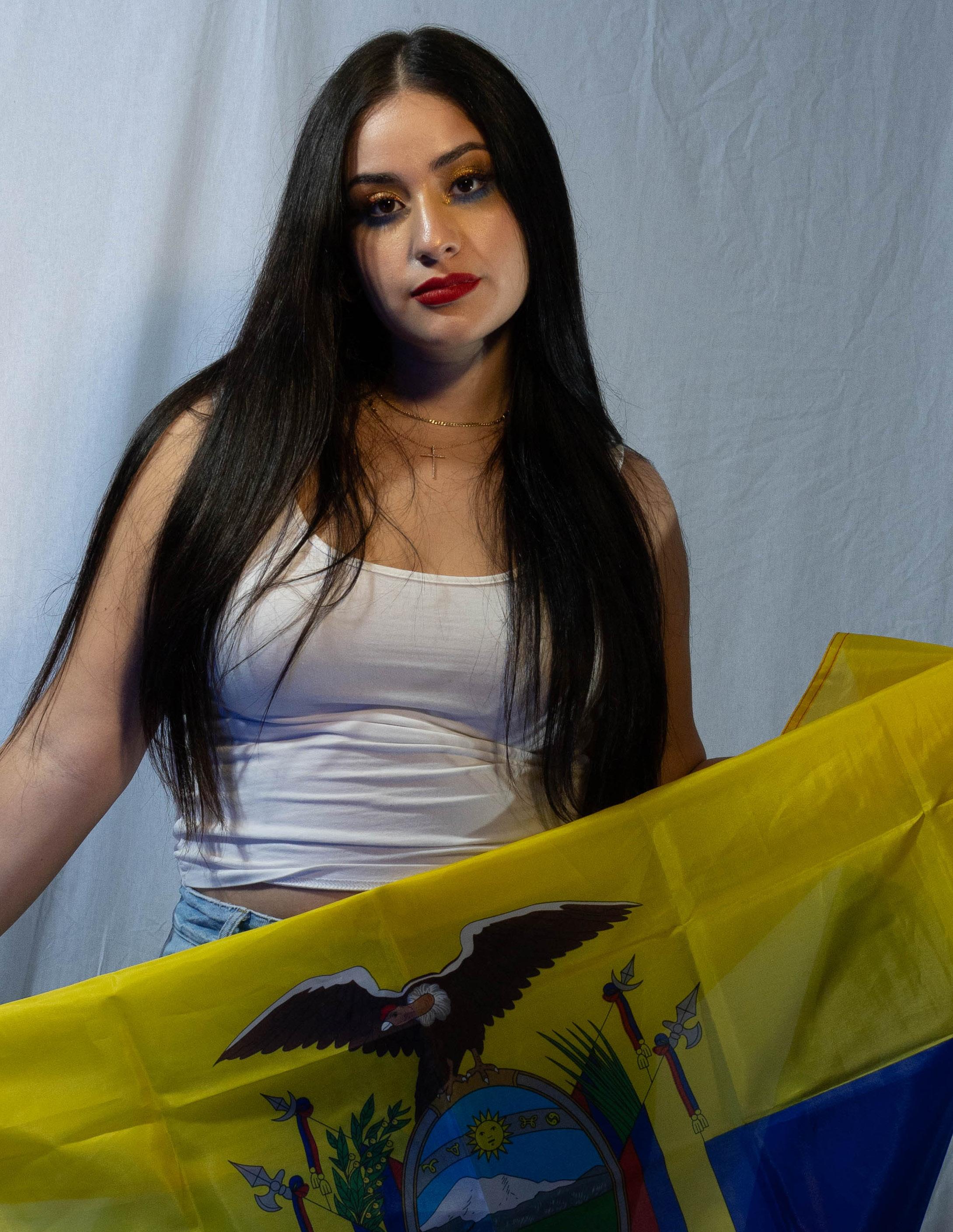



Photography: Devon Mitchell @_devon.mitchell_ & @mediabydev
Makeup: Aree Clarke @luxxaree & @scorpi.000 and CloudySky Khazraishokatkhou @somewherecloudy2.0
Models: De’Lisia Adorno, Ngina Valdez & Zev Kalechofsky
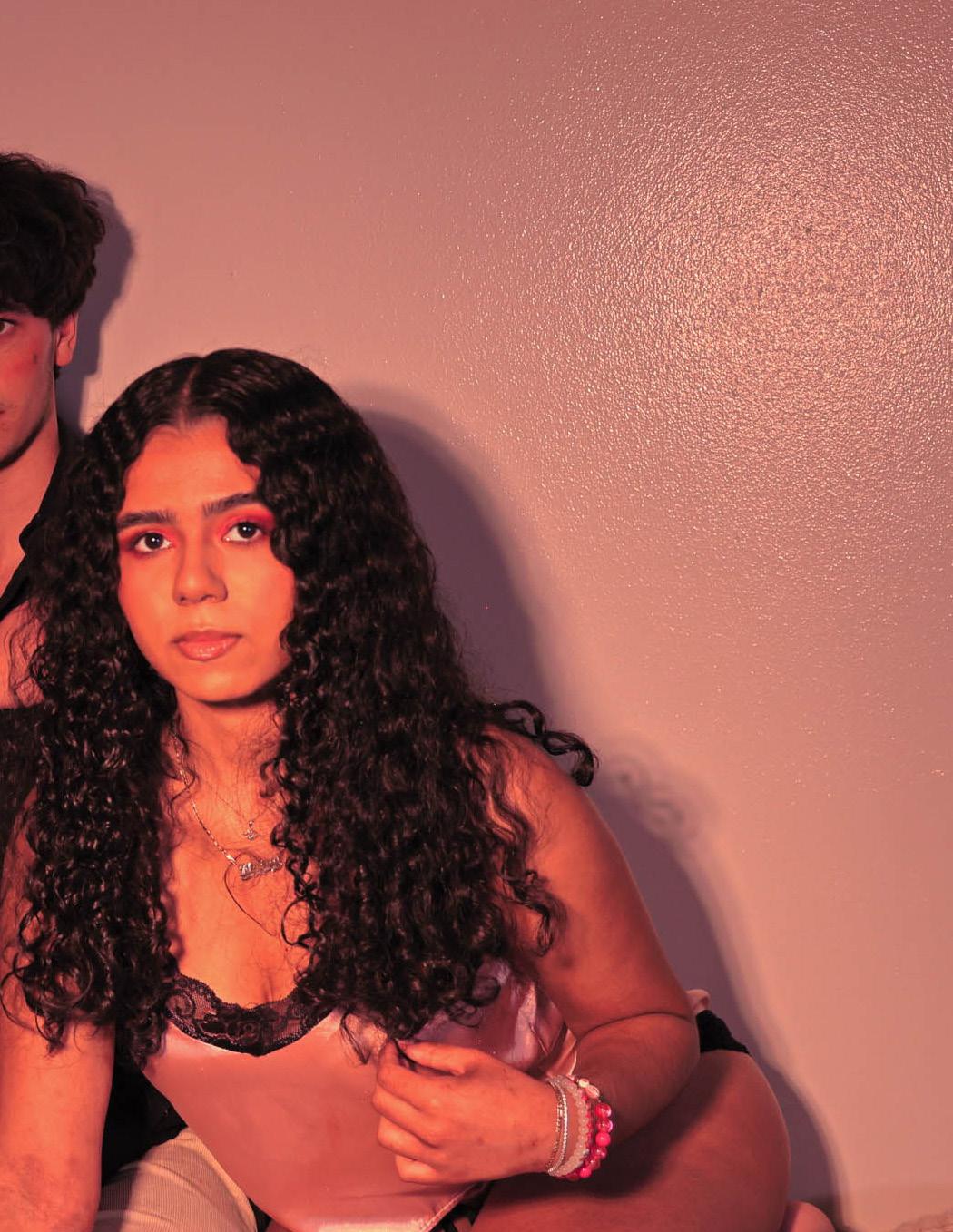
Shoot Highlights
